Business
Two Craft Brewers: Facing Challenges, Creating Opportunities, and Branding their Own Local Identities
Published
3 years agoon
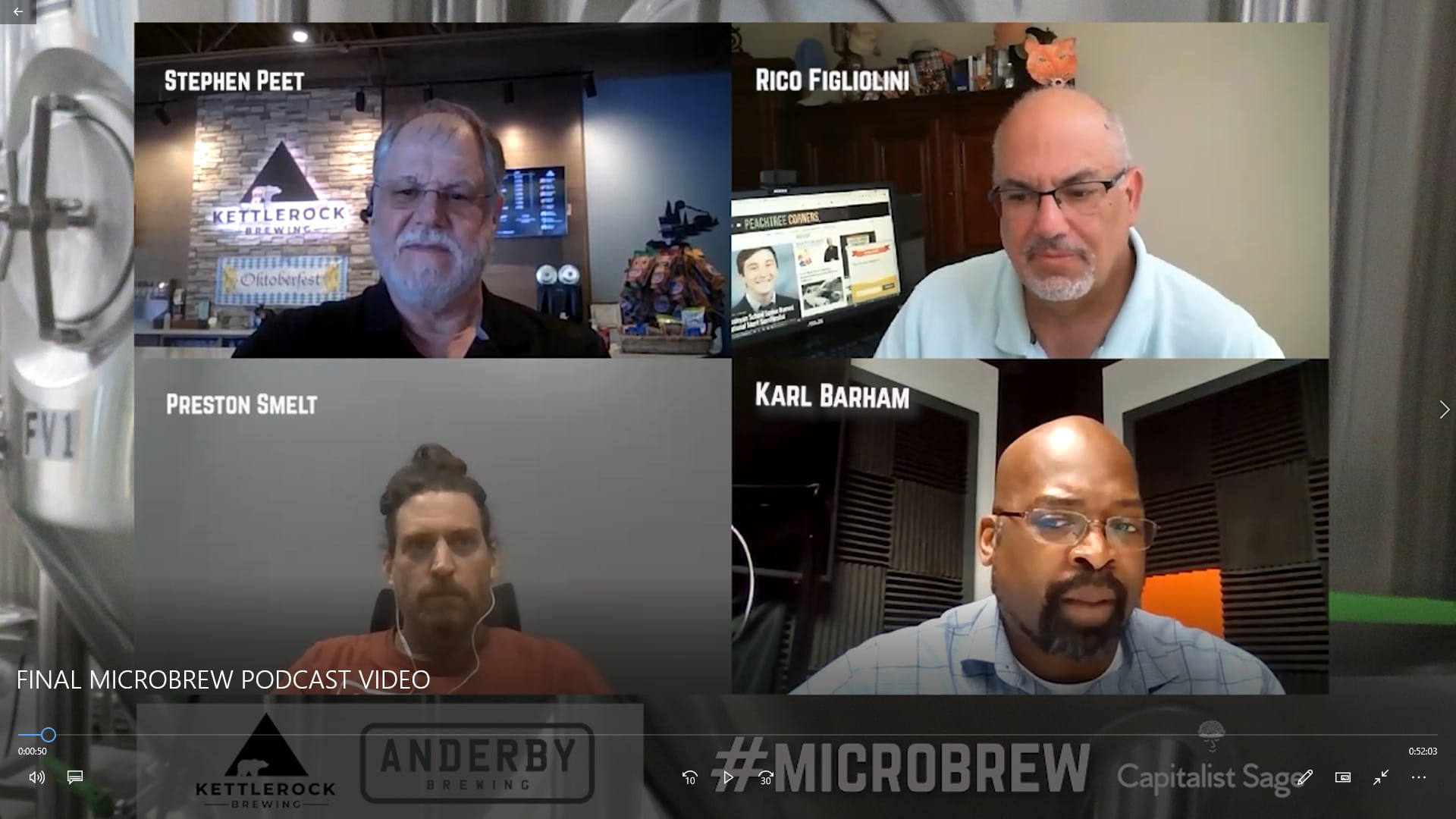
There’s a lot more to the Brewery business than just making beer. Despite the challenges facing businesses today, Anderby Brewing and Kettlerock Brewery have found their path. Their owners, Preston Smelt and Stephen Peet (respectively) talk about the collaboration as well as the competition in this line of business. Plus, they take an in-depth look at shippers, licensing, the marketplace, solving supply chain issues, and more. Join your hosts Karl Barham and Rico Figliolini with their latest Capitalist Sage Podcast.
Resources:
Kettlerock Website: https://kettlerockbrewing.com
Kettlerock Social: @KettlerockBrewing
Anderby Website: https://www.anderbybrewing.com
Anderby Social: @AnderbyBrewing
PC Mashers Homebrew Club: PCMashers.com
“As soon as you open your doors, you’re no longer brewing for you. Your personal tastes don’t matter anymore. You’re brewing for the people who come into your doors, or in my case are ordering us at restaurants or picking up cans at package stores. And so what I want from a beer, 9 times out of 10, doesn’t matter if that’s not what the consumer is willing to pay for. It’s the biggest change from homebrewing to being a commercial brewer, you’re a business now. So your personal tastes no longer matter if people are not willing to pay for it.”
pRESTON sMelt
Timestamp:
[00:00:30] – Intro
[00:01:46] – About Stephen and Preston
[00:03:23] – How Preston Got into Brewing
[00:05:33] – How Stephen Got into Brewing
[00:07:50] – Trial and Error and Making Beer for the Consumer
[00:11:38] – Regional and Seasonal Beers
[00:15:12] – The Business Models of Brewing
[00:22:17] – The Exciting Part of This Industry
[00:30:08] – How COVID has Impacted the Breweries
[00:31:47] – Supply Chain Issues
[00:39:18] – Upcoming Events at Both Breweries
[00:42:07] – Closing
Podcast Transcript
[00:00:30] Karl: Welcome to the Capitalist Sage Podcast. We’re here to bring you advice and tips from seasoned pros and experts and help you improve your business. I’m Karl Barham with Transworld Business Advisors, and my co-host is Rico Figliolini with Mighty Rockets Digital Marketing, and the publisher of our local and favorite Peachtree Corner Magazine. Hey Rico how are you doing?
[00:00:50] Rico: Hey, Karl. Good, thanks. Been a beautiful day after all that rain.
[00:00:54] Karl: It is, we are here in fall, which is going to lead to a fun topic today. We’re going to talk about a brewery. Local brewery businesses here in Peachtree Corners and surrounding areas. And we’re really honored to have Stephen Pete CEO of Kettlerock Brewing as well as Preston Smelt with Anderby Brewery to share a little bit about their experience. But first, why don’t you introduce our sponsors today Rico?
[00:01:19] Rico: Sure. Peachtree Corners Magazine is the sponsor of this show along with the family of podcasts that we do. Including Prime Lunchtime with City Manager and Peachtree Corners Life. We’re working on our next issue right now, actually. It goes to the press late next week. And you guys will be getting it the first week of October. It’s going to be a good, full packed issue. So I’m all excited to get it out and off my hands. So it’ll be in the mailbox hopefully sometime the week after next.
[00:01:46] Karl: Excellent. That sounds great. Well, I’m going to re-introduce my guests. The first is Stephen Peet, the CEO of Kettlerock Brewing. A local brewery business right here in Peachtree Corners. And he’s joined by Preston Smelt of Anderby Brewery, located in the Atlanta Tech Park area of Peachtree Corners. Why don’t we start off by Stephen, you introducing yourself a little bit and then we’ll have Preston give a quick bio and introduction.
[00:02:12] Preston: So I’ve been in Peachtree Corners here for a little over 30 years now and been involved in the community. The entire family has been involved in the community and the entire family is involved in kettle rock brewing. I’m not sure what all else you need to know other than come by and have a beer.
[00:02:30] Karl: I appreciate that. Preston?
[00:02:34] Preston: Yeah. My name is Preston Smelt and I’m president and head brewer here at Anderby Brewing. And we’ve been open since the end of July of 2019. So we got open just before everything went to hell. So we’ve been here just over two years, getting ready to actually hold our official second birthday party here next month. We’re going to be excited to get a lot of new stuff out for that. And a nice, big, outdoor area for everybody to come enjoy this nice fall weather we’re finally getting.
[00:03:00] Karl: Yeah. I’m excited for this season and getting out to visit both locations. But let’s talk a little bit, start by talking about, why the brewery industry. And we’ve seen a whole lot of new activity and businesses in this. What made you, and if I could start with Preston, get into brewing? How did you get into it? What made you think about opening up Anderby?
[00:03:23] Preston: All of our stories, I think we’re past the 7,000 brewery mark in the United States, a lot of us have a very similar story. Most of us started home brewing as did I. My wife bought me a Groupon to Brew Masters Warehouses, an old place in Marietta. That’s I think closed now that was doing a Learn to Homebrew class. This was seven, eight years ago. Loved it and immediately bought everything we needed to brew out of the kitchen while I was there. And then it just quickly expanded. It went from just little five gallon batches on the stove top to 15 gallon batches. They’re on a custom rig that I built in my backyard. And then that grew into a one barrel system in my garage, which then, two years ago grew into a 10 barrel system here at Anderby Brewing. So it escalated pretty quickly over seven years. And during that time, I also went and studied with places like The Siebel Institute out in Chicago, which is one of the country’s leading brewing schools for professional side to kind of hone everything in. Knowing this is what we wanted to do at some point in time. Got it done in the summer, right before we opened, actually. And yeah, then decided to open a brewery. SB85 passed, I don’t know what was that? 2017-ish if I remember. Yeah. So that allowed, this tap room model that you’re seeing us, Kettlerock, Social Fox, Cultivation, all the new breweries that are opening up are all following this tap room model. It allowed that to actually happen in the state of Georgia. Prior to that, you can only do tours and you had to be relying on distribution. You couldn’t just open a neighborhood tap room and survive. But as soon as SB85 passed, Peachtree Corners was one of the first kind of Northeast perimeter cities to adjust their local laws, to allow for this to happen. Which is a necessary step. I live in Dunwoody. I really wanted to put this in Dunwoody Dunwoody, not that, not that much foresight. So Dunwoody lost out on this opportunity. So we found a great place here in Peachtree Corners with a great landlord and made it happen. The city’s has been phenomenal to work with. And that’s kind of how we ended up here.
[00:05:24] Karl: How about you Stephen? Your experience and why you got into it. And you’re doing it as a family endeavor, so that brings an extra interesting aspect to this.
[00:05:33] Stephen: Absolutely. So it’s my wife and I. Diana and I are the owners and all four kids are involved in the brewery. Everyone has a full-time job outside of this. I’m the only full-time person that’s here at the brewery right now. Everybody’s just helping out in different areas. So my two oldest boys have been home brewing for 10 years now. And we are the founding members of the PC Mashers Homebrew Club here in Peachtree Corners, which if you’d like to be involved in that check out PCMashers.com. We meet the third Wednesday of every month. Most Homebrew clubs are bottle shares and ours is a bottle share as well. However, we have a style that we brew to each month and then we compare our beers to each others. And what that allows us to do is to help each other brew better beer. And a testament to that is that we entered the Suwanee Homebrew Fest a couple of years ago. And Sterling had not been wanting to enter beers in contests. I don’t know why, just he grumbles about that. But he did and he won second place with what is now our Float Trip IPA. But the Homebrew Club was first place in that competition because enough of us had gotten better. Enough of us had entered. There’s only about 10 to 14 of us in the club and enough of us entered and metaled. So that’s a testament to us all getting better. The local growler store Peachtree Growler had changed hands and had been talking about opening a brewery or brew pub in Peachtree Corners. And since that changed hands and didn’t happen, we kind of took that up. And decided as a family we could make this work. And Sterling is still the head brewer. Started out and still is. My daughter, Krista is actually one of the assistant brewers. And my second oldest Taylor, who was doing home brewing with Sterling. He’s one of the assistant brewers as well. And then Devin does marketing and everybody does a little bit of everything as you might guess when you’re a small business like this.
[00:07:50] Rico: It’s interesting because this business has, you have to have passion for this business, right?
[00:07:55] Stephen: Absolutely.
[00:07:56] Rico: Because it’s trial and error on almost every batch you do.
[00:08:01] Stephen: You’re right.
[00:08:02] Rico: So mistakes happen, I know. I was discussing with Preston last week when I visited with him at Anderby’s, it’s just like my father when he made wine at home. Because he was a wine maker at home for himself, three whiskey barrels was enough for the season he felt. He shared a lot of it with friends and family around Brooklyn. But you know, it’s trial and error. That’s one season of making grapes. You guys are constantly making different brews, adding different things to it, flavors and stuff. So how do you learn to do that? I mean, I know how Preston learned to do that, obviously. Getting formal education to a degree. But still right, Preston? I mean, you’re, still doing experimenting. That’s the best part of this, isn’t it? Being able to do that?
[00:08:48] Preston: Oh most definitely. I mean, there’s a lot of ways to learn. And Dana, my assistant brewer she’s a grad student, getting her master’s in microbiology. Which is a great asset to have in a field that is really, it’s part chemistry, part cooking, kind of all right. It’s an art and a science. And so we do a lot of experimenting. We brew on average twice a week, every week. So you can imagine we go through a lot of beer. And out of all the beers we make only five or six are staples, right? So everything’s, brew one time, move on, brew something different the next time. And so that allows you to iteratively learn. But then you also start to build connections within the brewing community, both in Georgia and in other states. And then you start to say, Hey, I really like this beer from you. How did you do X? Whatever it might be. It might be a fruit. How are you adding your fruits to your beers? There’s a lot of ways you can fruit a beer. You could put them in on the hot side. You can put them in pre-fermentation. You can put them in post fermentation. You don’t have to use real fruit at all. You can just use artificial flavors if you want to, just for whatever you’re trying to do. There are a lot of ways to accomplish things and trial and error is the best way for you to figure out what works for your system, for your pallet, for your customers. What works for the drinkers here in Atlanta may not sit well with the drinkers in California. So you have to kind of balance, what is your market? What is your demo preferring? And then make adjustments. And the first thing you learn, and I’m sure Stephen and then Sterling in the team at Kettlerock can attach to this. As soon as you open your doors, you’re no longer brewing for you. Your personal tastes don’t matter anymore. You’re brewing for the people who come into your doors, or in my case are ordering us at restaurants or picking up cans at package stores. And so what I want from a beer may 9 times out of 10, doesn’t matter if that’s not what the consumer is willing to pay for. And when you’re a business, it’s the biggest change from home brewing to being a commercial brewer is, you’re a business now. So your personal tastes no longer matter if people are not willing to pay for it.
[00:11:01] Stephen: That’s a really good point. And I’m going to throw out, Hard Seltzers is a big example of that. Most brewers will look at a hard seltzer and say, that’s not beer. That’s not beer. But Sam Adams, their major income is hard seltzers. Sam Adams is a beer company, but that’s their major income. That’s most breweries, micro-breweries will have a seltzer. It’s just something you have to have, because as Preston says, that’s what the market desires. That’s what the people want.
[00:11:38] Karl: Can I ask a question along that line? So, everything is local. If you’re from New York or Boston, there’s going to be certain pallets and tastes in what’s popular. If you were to describe what’s popular here in Georgia, or even in Gwinnett county and in the surrounding areas, what would be popular? In your opinion, in this area? And in specifically for each of you, what do you find to be some of the things that you do differently?
[00:12:04] Stephen: Well, that’s kind of a hard question, because I’m going to say that if you were in California, West Coast IPAs are the thing. That is the thing, a hoppy, hoppy beer. In Atlanta, people like hoppy beers. But not to the same extent, I think, as in folks along the West Coast. So that’s one example. Another would be, I think the fruit sours and such like that, that’s a little more of a Southern thing. It’s certainly, big breweries are, big microbreweries, I gotta be careful with that, are making sour beer. So clearly it’s a thing everywhere, but I think it’s a bigger thing when you’re talking in the south, in warmer climates.
[00:12:47] Preston: And I would echo a lot of that. You know, during the summer the fruity sours were a very good seller for us. We personally have seen that taper off here over the last month or so. I know regionally or in the Metro area, it’s tapered off a little bit. But the new England style IPA, the big hazy ones, those are ever popular. Whether they’re being made by us or importing from breweries from other states. There are a lot of the hazy IPA’s moved very fast. The Atlanta beer community also has a pretty big heavy stout following, right? So there’s a big portion of the Atlanta beer drinkers that love that big, heavy sweet stout, right? A candy stout or a flavored stout, things of that nature. And those are not easy to do well, right? To balance the boozy-ness of a 13% Imperial stout with that thickness, with the sweetness and whatever flavors you’re trying to introduce. And we’ve got a few here in town that are doing well. And there are a few heavily sought after breweries in the greater region. Especially with some of the guys out of Florida, that do this stuff pretty well, also being sought after. So, that’s where I see the beer drinker being right now as we move into the fall. I definitely think the bigger, darker beers are gonna turn on. It’s weird. I hear a lot of people ask for a lot of the classic styles, blonde, English mild, but it’s weird because as a brewery, they don’t sell as much. So people seem to, there was a vocal minority that wants these types of beers, but then when you have them, they don’t move as quickly as the others. And, you know, beer does have a shelf life. So that’s something that you have to kind of weigh. I also think some of the classic styles cannibalize each other in sales. So if you have too many at one time, none of them are really going to sell well. So you’ve just got, like for us with 19 taps. We just have to be careful how many of each style we have at any one point in time, because then everything will just cannibalize each other and then it just, some of it can go bad and we have to dump it and that’s not fun.
[00:14:45] Stephen: So beers tend to be more seasonal, I think, than regional in a sense. I mean the darker beers, the heavier beers, the barrel aged beers, those tend to be in the winter months more interested by the consumers. And obviously in the summertime, then you’re looking for, as they call it lawnmower beers, porch beers, poolside beers, things like that. So there’s certainly a seasonal aspect of it as well.
[00:15:12] Karl: I’m curious about the business side of this, the different revenue models. Can you describe some of the options you explored in your businesses? And which ones you really found to be areas that you want to focus on?
[00:15:27] Stephen: In our case our business model is, right now is just the taproom. Draft beer sales right here at Kettlerock and also hosting events. We’ve already had a number of events. We have a number of events that are scheduled. That’s a big deal. We’re going to be doing distribution and that way we can have our beer available in the local restaurants and the local stores and such like that. So obviously that’s a future. The other business model, which is typical of microbreweries is having some entertainment here, be it trivia or music. We’ve just started the music. The issue with that is licensing. You can’t just say, oh, I want to have some music in the taproom and I’m going to turn on the radio. No, you have to have the right thing that’s been licensed properly and paying for that with ASCAP and BMI. And when you have live entertainment, then you have to pay BMI and ASCAP directly so that the royalties go to the right people and all that sort of good stuff. So we’ve just started that. We’ve had two events, two of the same band and one of another. And we’ve got some others coming up. And others that have been interested in coming by and playing for us. So that’s kind of our model at this moment. And then, like I say, we’ll be getting into the distribution.
[00:16:50] Karl: Preston, how about you guys?
[00:16:51] Preston: As a brewery there’s really two ways to make money. You drive people into your taproom or you distribute. We do both. We’re trying to do both. We picked our location because of the dearth of offices that had lots of people working in them in 2019. So you know, our challenge on the taproom side is that there aren’t as many people working in Tech Park as there were two years ago. So that’s been a weekday challenge, especially. And there’s only so much you can do on the weekends. So yeah, we do trivia. We have a very successful trivia night .It’s probably one of our most consistent best days of week. We’ve been running it short of the shutdown period, pretty much every Thursday night since we opened. So it’s become a regular. We have, five, six regular teams that come and play every week with us. So it’s a fun event here, which does help. The live music we have a licensing now. We definitely have a band scheduled for our second birthday party in October. But it’s a catch 22. And for the longest time, I just refused to do it simply because of what Stephen was talking about with that licensing. That is the best racket out there. They charge you based off how many people they physically think can fit in your building, whether or not you ever have that kind of foot traffic. Fire Marshall codes may include your production facility as part of your occupancy number. Even though you’re not going to let people just hang out in your production facility and in our case, it’s closed off. You physically can’t go back there. You know, including that in our occupancy numbers drives up our price point on things like music licenses. And we’ve finally been able to negotiate with those guys to get something reasonable. But then yeah, then you have to pay a band. You have to make sure that whoever you hired to do live music fits the vibe of your establishment. We, my wife and I, Michelle, she manages all of our sales and marketing and does all of our social media. Our vibe is hard rock. We are hard rock fans from across multiple generations. So like our typical station here is rock ball. All of a sudden we bring in blues guitarists. While I love blues guitar, that’s not the vibe and the ambience that we’ve created here. And so then it doesn’t fit. And then our customers are confused by it. Like, how does this connect to Anderby? So we have to always like, we’re very careful about when we do bring in light music or consider artists. We’re staying true to who we are and the brand that we’ve established is Anderby Brewing and not just hey, some guy with a guitar showed up. We’re just gonna let him set up and play. Which people do they show up with the guitar and say, Hey.
[00:19:24] Stephen: I had one last week show up.
[00:19:28] Preston: Yep.
[00:19:28] Rico: Everyone’s looking for a gig, right? Everyone’s looking.
[00:19:32] Karl: On one side you have that, but then, there’s the open mic kind of vibe where folks are coming in and they’re trying.
[00:19:40] Preston: We tried comedy night. And it was fine. We’ve tried a lot of things and this is a business podcast, right? So you have to look at ROI, right? If you make, I’m just gonna throw out numbers, if you make $2,000 on a Friday. And remember we’re talking beer sales, like both Kettlerock and I, we only make money on beer sales. 6, $7 a glass, you’re pouring a lot of beer to get to $2,000 in sales. And then all of a sudden, some band comes up and says, Hey, three hours, Friday night, $500. And you’re like well, you may be worth $500 because you’re good. But am I going to increase my sales by at least $500?
[00:20:15] Stephen: Exactly.
[00:20:15] Preston: Preferably more, because if the answer’s no, then go away, right? No, there’s no point in doing it. And so every time we evaluate this is what happened with comedy night. Like we closed our doors to the public, ticketed event, sold beer by the pint. And I think we actually lost money on the deal because I think we turned away more regular customers who didn’t care about the comedy night and just wanted to come in and drink beer. Then we would have gotten on ticket sales. So it’s just, you have to be very careful in how you evaluate events and understand what the ROI is and what ROI you need. Especially if you’re going to be outlaying money to do it.
[00:20:50] Karl: Oh, that’s a very good point. And a lot of that comes with, you know, you try some things. And there might be, what is it that your ideal client would be willing to pay or could draw in more? And at the beginning and in an area when you bring anything new, it’s feeling that out and trying it out and trying to get that established. And you can see a lot of businesses will struggle with that early on, but then they’ll find their niche. I remember the local restaurant that did blues and a band that came on the Sunday night, band that would play. And it had been doing it for 10 years. And I will tell you, it would absolutely be like people can not get in the door on that night. But they had established that as a thing. They had a promoter that probably helped promote that. And it was their thing. And it drew enough extra people to obviously more than make the ROI on that. But of course, that probably didn’t happen the first night they did it. They probably had to invest in it over a long period of time, build up a following, et cetera. So those are all some of the challenges that business owners have to go through. So that makes perfect sense. If I could broaden out a little bit, help me understand some of the trends you’re seeing in brewing that you’re intrigued by. Is there things that are happening new in the industry that you think, that’s getting you pretty excited?
[00:22:17] Preston: I’ll take this one first. The best thing about this industry is everybody’s always trying to innovate. And so the argument now is who invented the hazy IPA, right? The new England style IPA. A couple of breweries tried to claim credit for it. And then you hear people in Chicago saying, oh, no, we were making them around the same time. So everybody’s always trying to innovate and find the next thing that hits at a macro level. Because that can put you on the map. Creature Comforts found Tropicalia and it blew up and then they blew up because of Tropicalia blowing up. So the best thing about this business is everybody is always trying different stuff. Again, we’ve brewed 60 different beers this year. Just this year, right? That doesn’t even include last year or the little bit in 19. We’re always trying things and saying, Hey what worked, what didn’t, what flavor combinations work? What flavor combinations didn’t? We have hundreds of grain varietals at our disposal. We have hundreds of hop varieties at our disposal. We have hundreds of yeast varietals at our disposal. Every single one of those bring their own unique flavor to a beer. Stephen and I could make the same beer using the same ingredients, it maybe radically different just by the ratios or the timing of when we use certain things or didn’t. You know, it’s a fun business. And that’s what I love about it. There is such a thing as bad beer. You can make a bad beer and that does happen. But the reality is everybody’s just trying to innovate and you have to be willing to take chances and try something new. Or you’re just going to squander in obscurity, just making the same stuff everybody else makes. And that’s the trick.
[00:24:00] Stephen: I want to take that just a little bit differently and I’m going to say one of the things that’s really cool about this industry that I’ve enjoyed before we started in it. I knew that it was happening. And I’m going to take two words out of, first robotics, core values, and philosophies. Gracious professionalism and coopertition. The craft brewing industry is very cooperative. And obviously there’s competition. There’s competition between Preston and I obviously. I’m selling beer, he’s selling beer. Clearly my beer is better than him. From his point of view, his beer is better than mine. Or our beers compliment each other, depending on which styles I have. And he doesn’t and which styles he has that I don’t. So you have both of those things going on. The other day, he ran out of nitrogen. I have a tank. He can borrow my tank until he gets it. That’s no big deal. You’ll see the Georgia Craft Brewers Guild actually facilitates this. And also the brewers association helps a little bit. But with the craft brewers Guild, for instance, somebody had put out an email blast, Hey, I was supposed to get 500 pounds of Pilsner malt and it didn’t come in. Does anybody have some and somebody else goes, oh yeah, sure. Come and get mine. You can either pay me for it or replace it. I mean, how many other industries do you see doing things like that? That’s been an incredible trend that I’ve seen before we got involved in it. And since I’ve been involved in it. I think it’s really cool.
[00:25:37] Rico: I mean, that’s because it is a passionate business. It is artists and it is people crafting, literally crafting, you know, art. I mean, that’s what it is right?
[00:25:48] Stephen: It’s an art and a science. There’s no doubt there’s a science to it, especially for repeatability. Measuring and all those sorts of things. But then there’s the art part just like Preston was saying with cooking and baking,
[00:26:01] Rico: Because when do you stop the fermentation or when do you heat it? What temperatures you go? I mean, it’s just really something that most people should appreciate.
[00:26:11] Preston: The great thing that we’ve seen here, is we have four breweries all in the Peachtree Corners, Norcross area. So what is that, three miles? I think the farthest distance from any one of us is three miles.
[00:26:22] Stephen: Yep.
[00:26:22] Preston: All four of us are doing, we’ve all created a different vibe. We all have our own way and approach to how we make beer. And there’s enough uniqueness, especially between the four of us right now that we’re all doing something different. The coopertition side of things. I came out of the hotel industry and we used that a lot, especially in downtown Atlanta. Where we were always, yes, we were competing, but at the same time, we’ve worked together on things too. Cultivation and I have a collaboration in my tanks right now that we’ll be releasing in November. They came here and we actually brewed together for an entire day and that collaboration’s coming out here in late November. So we do work together on a lot of things, but we are also competing for the same people. Especially, in a limited demand cycle we’re in right now. But we’re also all doing enough things differently. And we’ve found our own voices that it’s not really direct. There are things Cultivation does very well that I don’t do. And I can’t. Just to be honest with my scale versus compared to their scale, I just can’t do it. Likewise, there are styles that we’re making that are just a little bit different and we put a different twist on it then everybody else around town. So it works harmoniously. And it should be, right? Downtown Asheville has almost as many breweries just in downtown Asheville as the entire Atlanta Metro has. There’s like 50 breweries in Atlanta metro. There’s not quite that many downtown Asheville, but there’s definitely like 20 you could just walk to. They all coexist and they all coexist because they work together. They all find their own niche in what they want to focus on and what they want to specialize in versus what everybody else is doing. And it starts to create a community and bring people in. And that’s what we’re trying to do between the four of us with the Norcross Peachtree corners community. Is get people to come in from Roswell or Stone Mountain or Duluth or Suwanee or wherever else. There may be beer crowds that are reasonably drive in. Come spend a day in Peachtree corners in Norcross and experience all four of us.
[00:28:18] Rico: This is so different from other businesses. It’s almost like shoe business in a way. Where people want to see five stores because they’re going to go visit each one of them. That’s almost what it’s like, isn’t it? I mean, you want to be able to know the city has three or four or five places. You can just bounce around and try everyone’s brew.
[00:28:36] Stephen: Yeah. I have several customers that come in and say, you’re one of the four I’m going to. I’m supporting all four of you. And I get a different beer at each place.
[00:28:45] Karl: And I could say even expanding. I spent 15 years traveling, corporate, to meeting salesman, client meetings. And you’d spend all day in a conference room or meeting rooms working through meetings. And in each one of those, if you flied in on Monday, there’s a Monday night, Tuesday night, Wednesday night, possibly Thursday night before everybody flied out on Friday. And I used to admire the staff that would coordinate all of that. People are in hotel rooms. There’d be dinners every night. And there would be pre dinner, there would be dinner and there would be post dinner. And very often in some cities we’d go to a brewery first, and then we’d go to dinner somewhere. And then those would go back and do work in their rooms or sleep. And then there’d be a group that would stay a little bit later and go to another. And so we always looked for cities and towns that had enough of those kinds of places so that you can feature different places. So as the economy comes back and people start coming back to offices and people start doing conferences again, I could see having this group of breweries and in both of the two in Peachtree Corners and have options, that’ll make it easier for people planning meetings and hosting meetings. To not have to think about do we have to go to one place every night? Nope, you’ve got options and everyone ends up winning and being successful in that.
[00:30:08] Rico: And I think, Preston when we had our conversation last week. You mentioned that in March, between like March and May or something? Around that area. When people were finally looking like they were opening up, coming back, things would be, this was before the variant came, the Delta thing. But you mentioned that it was like you saw a window of what it would look like once we were back to a place where everything was open and that was a good place, wasn’t it?
[00:30:33] Preston: Oh, yeah, it was great. It was, yeah, it was like a 10 week window that we got of, this is what life would look like. It’s a brewery, it’s on Tech Park with even just a hint of normalcy. Like we weren’t even back then, there wasn’t even really, truly normal. We were just closer to normal than we had been since March of 2020. And we just got that little glimpse of it. And then, yeah, by the end of June, July, all of it was gone. It was just back to nobody’s going out. I mean, anybody who knows Tech Park or that’s listening to the podcast, four o’clock at Tech Park prior to March of 2020 was a nightmare to get in out of. There’s just lines of cars, either side, all three, four exits out of Tech Park, all of them were backed up. There was no good way to go. I used to sit on the patio during build-out and just watch 45 minutes of traffic of just people trying to get onto Spalding. And you’re like, yeah, this location is going to rock once we can get to the spring. We just need to get to spring. And now you go sit any day of the week on Tech Park and at four o’clock and you may see three, four cars. And so we got a little bit of that in March and April, May. And then by June, it just all started to evaporate again.
[00:31:47] Rico: So I want to ask another question if you don’t mind. I guess to either one, so maybe Peet first. Supply chain. I know that’s an issue with a lot of businesses right now. And especially in your business with where it’s like on demand almost or like at the moment that you need it. Has supply chain been an issue?
[00:32:04] Stephen: It has not been an issue for us in general. I’ve had a specific supplier who has struggled. He’s messed up with deliveries and some other things. So I don’t want to call them out on that. It’s not really a supply chain issue. Now there has been, and has been talked about, an aluminum cans shortage. There were several soft drinks that last year this time, I could not get it in can. I am pretty sure it’s because it was not as popular a soda. Therefore they were putting it in other packaging, plastic bottles and such like that. I’ve talked with a can supplier if I want half a pallet, not a big deal. If I want an entire truckload, that can be a problem from a supply chain point of view. Because of the aluminum shortage that happened last year, when you know, the world stopped going out. And they started going to grocery stores and buying their beer in cans or sodas and cans. Everybody’s going to canned goods instead of the opposite. The draft beer industry really tanked at that time, because you couldn’t go out to restaurants and such. So what are you going to do with a keg of beer? That was a big problem. It’s not as much of a problem now, but there are other things. I haven’t seen it as far as raw materials coming in to our brewery, but more just the general groceries and things like that you hear about.
[00:33:33] Karl: How about you Preston?
[00:33:33] Preston: I don’t know if anyone saw my facial reaction when that question was asked, but, I got the exact opposite impact. It’s a cluster. We order fresh fruit. Like anytime you see Anderby selling anything with fruit in it, it’s a hundred percent real fruit. So I have suppliers all over the country that we work with on a regular basis. And it is a nightmare right now. Trying to get anything. Saturday we were supposed to be releasing a blood orange cranberry seltzer as part of our big Seltzer Fest for Saturday. And we ordered the blood orange and the cranberries from Oregon. Oh, three weeks ago. They were supposed to be delivered no later than Tuesday. And then Tuesday, they’d only made it to Utah. I don’t know where they’re at right now. I might get them next week. And this is after paying for priority freight to make sure nothing happened. And they actually got here. And this isn’t a one-off. This happens fairly often and most of the, Stephen mentioned earlier like, hey, somebody is like, oh, I need 500 pounds of Pilsner, or I need 40 pounds of hops. That’s all because of supply chain issues. And the logistics companies, I don’t care who they are all having problems. And again, there’s no need to name them because literally everyone has had a problem.
[00:34:51] Stephen: Right.
[00:34:52] Preston: It’s not even worth naming names. Because I don’t care who the supplier is and I don’t care who the freight company is. None of them are perfect right now. Or anywhere near perfect. To the point where I told one of them yesterday, or this morning, that charging people for priority service is basically theft. Because they can’t deliver it. So why are you charging people for priority service when it’s worse than your actual economy service? And that’s not an over-exaggeration. You pay somebody, a freight company, an extra couple of hundred dollars to make sure you get something here on time from across the country. Again, we’re small businesses. We’re two years in surviving COVID. We’re breaking even proposition at best right now. And so you actually do something to spend a couple extra hundred dollars to get something that you really need here on time. And then the freight companies can’t deliver it and do it simply because, I don’t care. I mean, you call anybody right now, you have any sort of problems, nobody takes accountability. They just say, oh well, you know, it’s COVID. That’s all you hear. I’ve been waiting on the IRS for 370 days on tax returns from 2019. And they go, okay, it’s COVID. I think most businesses who are in operation last year who got the…
[00:36:03] Karl: The PPP?
[00:36:03] Preston: The PPP they were actually pretty efficient on. The SBA did a really good job on that one, but there was something else the IRS, there’s a tax credit. Employee retention tax credit. I think everybody’s still waiting on their employee retention tax credits. And they said the turnaround time was like eight weeks. We’re at like 16, 20, something like that. So forget eight weeks. And when you’re small businesses, you need this kind of reinjection of capital. Because that’s what’s going to help sustain you through the next round of, through the current downturn we’re still fighting in. You want that capital, whatever it is. 5,000 who cares? It’s going to help you get the next thing. So when you tell a freight company, Hey, I’ll pay a couple extra hundred dollars just so you don’t screw this one up and then they can’t deliver. They don’t give you back to $200. They’re hardly apologetic. I still don’t know when my blood oranges and cranberries are coming, but they definitely won’t be here for Saturday. So that ship’s sailed. So it’s hard as a brewery or anybody right now to say you’re going to do X on a certain day and have it ready. And it doesn’t like, again, we plan three weeks ahead of time for a buffer and then they’re blowing through the three weeks, the buffer, and then it’s going to be a week later after that. So five weeks to get something from Oregon to Atlanta.
[00:37:11] Karl: I’m noticing something now, too. That’s affecting a lot of business owners and even consumers as the holiday season approaches. We were talking even in our household, ordering things on Amazon. If you start looking at the delivery dates, really simple, basic things. They’re not even promising delivery, things that would be what, two days, three days. They’re talking up sometime in mid-November to get. So I could imagine what Christmas will look like for kids or for businesses as they scale up for a holiday season and can’t get supplies and a supply chain. So folks are starting to, I think, start ordering more sooner. Which makes it worse, because I feel like some of the stuff that happened with toilet paper, will start happening on certain commodities and items. Because everyone’s going to order a lot early because they’re afraid that it won’t get there and then it makes the problem worse. So it is a challenging time for business owners.
[00:38:10] Preston: And for us it’s hard, but there’s certain things that are just hard to stock up on. A lot of this stuff you want to use fresh, if you’re doing stuff with fruit. I mean, ‘A’ it’s cashflow, right? I mean, this is again, a business focused podcast. Most of us don’t have the kind of cashflow where we could absorb in June ordering $20,000 worth of fruit to get us through the next six months on everything we think we might want to make and just have it sit in a warehouse in Atlanta, in the summer. The risk of spoilage is greater. There are a lot of risks to buds, contaminations. And then, so you try to do just-in-time as much as you can. But then because of just supply chain issues maybe the producers have a bad crop. I mean, crap. We’re about to run into a bad crop year for hops for next year because the weather, the climate in the Pacific Northwest this year was horrible. And it devastated hundreds of acres of hops that will now create shortages for certain varietals for 2022. And so I had to take a lot of my summer cash and stock up on some of my key hops for next year, just to make sure we could make a couple of our core beers for six months.
[00:39:18] Karl: No, that makes sense. Well, I do want to ask a question just coming into the fall season now. Do you have things going on? Why don’t you tell folks a little bit about what you’ve got going on and how they can find you? Maybe addresses and locations for folks in the surrounding community or visiting can come and visit both locations. Start with you, Stephen
[00:39:39] Stephen: Well, we’re at 6025 Peachtree Parkway right here on 141. Catty-corner from the Marriott. So we’re pretty easy to find. We’re at KettlerockBrewing.com as our website. And we’re on Facebook as Kettlerock and Instagram as @KettleRockBrewing. So those are choices for that. Then you said this fall?
[00:40:00] Karl: Any events coming up that you’d like to share with folks?
[00:40:02] Stephen: We have, again, you’ll have to check the website to see when. And if you sign up for email, go to the website, sign up for emails or follow us on Facebook or Instagram to get the latest as we add the different events and things. We have a wedding rehearsal party tonight. It’ll be right here at the brewery and headed to the wedding tomorrow for that. That’s how to find us. We’re right here. It’s easy to see.
[00:40:27] Karl: Thanks. Preston, how about you?
[00:40:29] Preston: So we’re 110 technology Parkway right next to the Spalding animal clinic off of Spalding and Tech Park. So we’re also very easy to find. Saturday the 25th, so I don’t know when it’s getting released to the public, but two days from now is the launch of our Cat Lady Seltzer brand. We’ll have Fur Kids out here, all the seltzer sales, a portion of proceeds benefit Fur Kids. They’ll be here with cat adoptions, cat lady contest, all sorts of stuff. Lot of cats going around on the brewery Saturday, it’ll be fun. We are pet friendly. So dogs, we like dogs too. In fact, we love dogs. End of October, I think it’s the 30th, whatever this last Saturday of October is our second birthday party. We’ll have four stout releases, six stout releases, sorry. Four barrel aged stout variant releases and then two other stouts that will be coming out. All of them are 12 and a half, 13%. So very big stouts. It’ll be a big stout day here. A live band, a couple of food trucks. Outside of that food trucks, five days a week. So Tuesday, Thursday, Friday, Saturday, Sundays, we’ll have food trucks out here. You can find us at AnderbyBrewing.com or @AnderbyBrewing on Insta, Facebook and Twitter. Food truck lineups are posted. So who’s going to be here, what times they’ll be here, all on our social media and our website.
[00:41:41] Stephen: You reminded me that as you can see, we have Oktoberfest here and that’s something that’s happening. It’s not as much a future thing. Mayor Mason was here Saturday. As the mayor of Munich would tap the first keg Mayor Mason was here to pull our first Fest beer. So we’ve certainly got that going on. and like I said, we have live music going on, so all that’s happening.
[00:42:07] Karl: Well, I really want to thank both Stephen Peet of Kettlerock Brewing and Preston Amelt of Anderby Brewing. Just highlighting some of the great things here in Peachtree Corners. This ecosystem of breweries that’s creating something unique in this area, Metro Atlanta. That helps folks after work can go out and grab a beer and enjoy themselves. They can do that as well. I want to thank both of you for joining us and bringing your stories and just sharing with the community how you started and managing your business. And we emplore everybody, come out and support local brewing. Go grab a beer when you get a chance.
[00:42:43] Stephen: And thanks for hosting this. We really appreciate it, both Preston and I, and the other breweries in the area. Come have a beer.
[00:42:51] Karl: It’s our pleasure. The Capitalist Sage Podcast is here in Peachtree Corners to talk to business owners, share about some of the successes and challenges and just be part of that cooperative. On the theme of some of the conversation today, we want all business owners to kind of understand what it’s like to be part of this community. I’m Karl Barham with Transworld Business Advisors of Atlanta Peachtree. Our business advisors are available to consult with businesses, whether you’re looking to improve through growth and acquisition, whether you’re looking to exit the business, we help with business sales. You can schedule a consultation at KBarham@TWorld.com. You can email me there or visit our website, www.TWorld.com/Atlanta-Peachtree. We’re here to help the local business community in any way we can. Rico, why don’t you tell us a little bit about what you’ve got coming up?
[00:43:40] Rico: Sure. So the next issue, as I mentioned before, of Peachtree Corners Magazine will be coming out the first week of October. You can visit the website at LivingInPeachtreeCorners.com. Check out the podcasts, we have the news that goes on that website and follow us on social media. We also do other things, I’m a creative director, social media marketing as well, video production to a degree. So if you’re looking for that, check out MightyRockets.com or just look for Rico Figliolini on LinkedIn, because there aren’t that many of us. To spell it, F I G L I O L I N I, and we’ll be all good. Thank you guys. This was excellent. I’m going to have to go get a beer after this.
[00:44:19] Karl: Absolutely. Thank you guys. I’ll be seeing both of you soon. I’m coming out to visit. Take care.
[00:44:27] Rico: Thank you.
Related
Business
The Forum Gives Sneak Peek of New Eateries and Community Spaces
Published
2 days agoon
July 24, 2024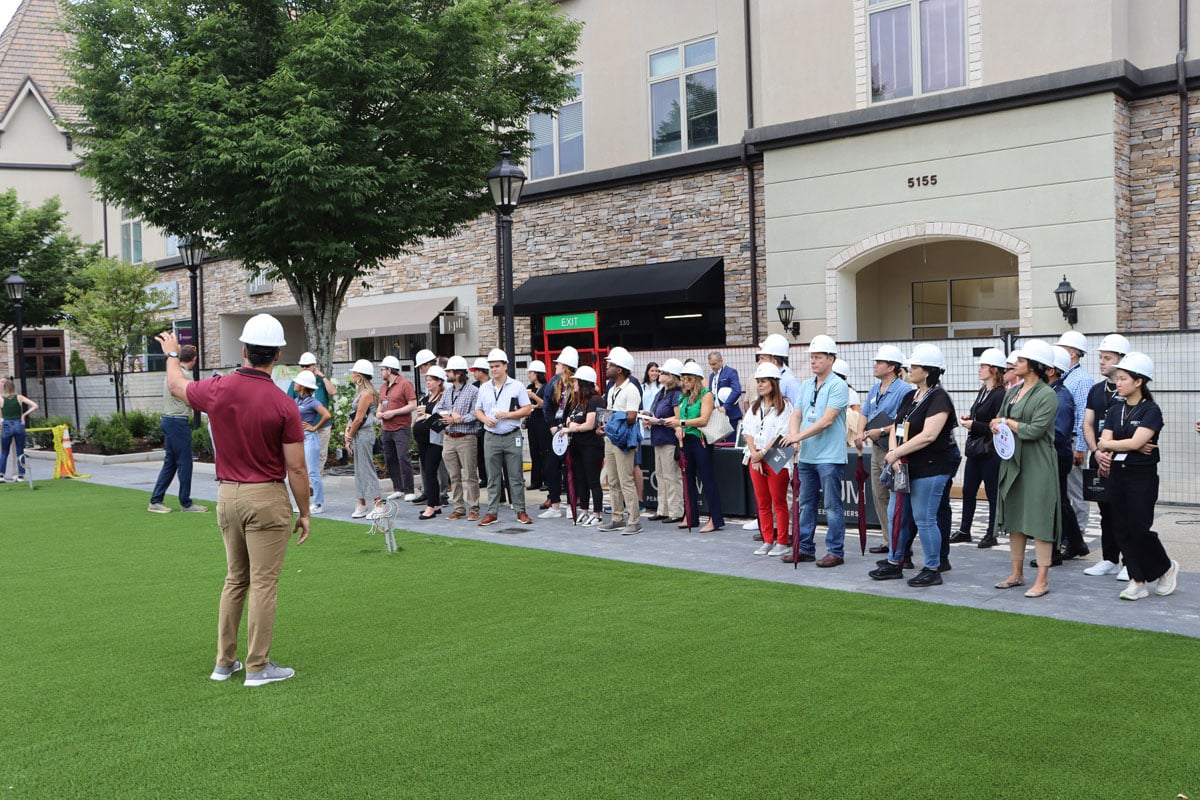
If you’ve been to or near the Forum in the past few months, you’ve probably noticed cranes and construction crews. The anticipation of the first phase of renovation of the 22-year-old retail center has left a lot of Peachtree Corners residents as well as nearby patrons excited to see changes.
The Forum administration invited the media for a hard hat tour on July 17. The event showcased the redevelopment progress ahead of The Plaza’s grand opening on Aug. 8.

Scrumptious bites incoming
Executives from the development and leasing teams joined on-site management and led attendees around the new central gathering space, guest amenities and Politan Row, the newly created 10,000-square-foot food hall.
Dining concepts from veterans at Sheesh, Twenty-Six Thai and newbie Gekko Kitchen were the first food vendors announced for the space, which is expected to open in January.
“We can’t wait to introduce the Peachtree Corners community to our food hall experience,” said Politan Group CEO Will Donaldson in a news release. “Every detail from the design to the bar program to the cuisine is thoughtfully curated to inspire guests to not only mingle with one another but to connect with our incredible restaurateurs and discover new favorites.”
During the tour, Donaldson explained that eventually there will be seven different global cuisines in the Politan Row food court at the Forum featuring well-known and up-and-coming local talent. Once complete there will be a central bar, a private event venue and a covered outdoor patio.
“One of the things that we’re excited about is this unique design that we’ve come up with, that’s very specific to this area,” he said. “We’ll be open seven days a week for lunch and dinner. Whether you’re with a group for lunch or with your family, it works great for multiple settings.”
Twenty-six Thai owner Niki Pattharakositkul said the restaurant will work with local vendors to source the freshest meats and produce possible.
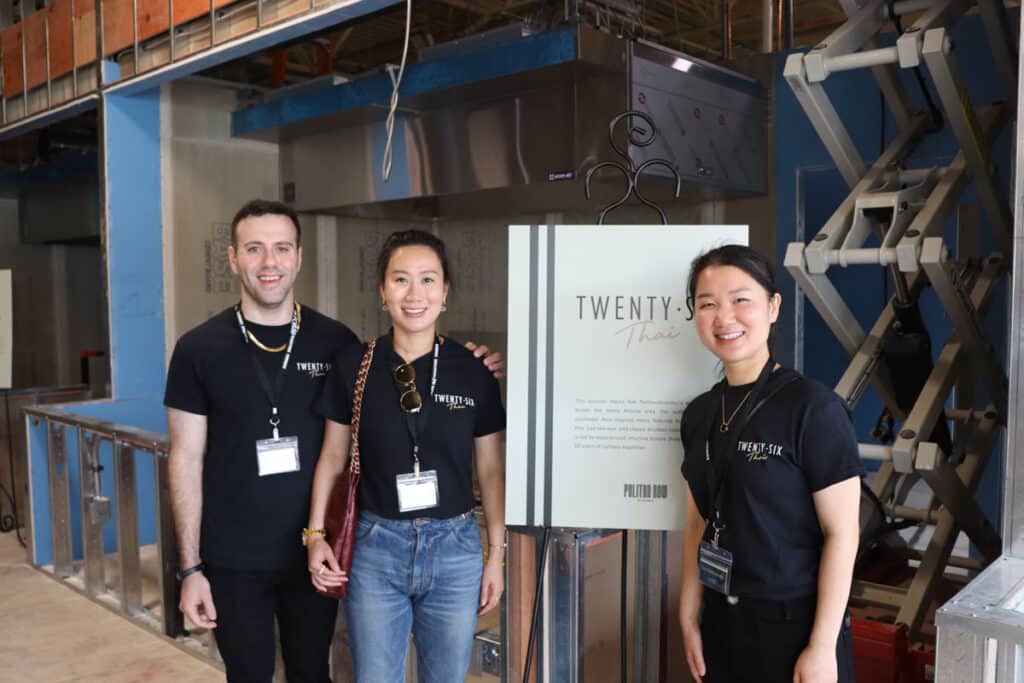
“There are certain types of produce and protein we try to source locally, but sauces and the more exotic produce and herbs, we have to import from Thailand,” she said. “Our brand is trying to move towards doing things locally and sustainably.”
Working with organizations such as Georgia Grown limits the use of large food distribution companies. Since starting Twenty-six Thai in 2016, Pattharakositkul has launched seven locations across metro Atlanta, including at Politan Row’s Ashford Lane and Colony Square.
The eatery describes itself as an “authentic wok-fired Southeast Asia-inspired menu featuring items such as pad Thai, pad see ewe and classic drunken noodles.”
Sheesh, a Mediterranean concept that uses simple, wholesome ingredients prepared with unique spices and blends, is run by corporate executive chef Charlie Sunyapong and director of operations Raquel Stalcup. The two are also members of the group behind full-service restaurants Stäge at Town Center and Pêche at the Forum.
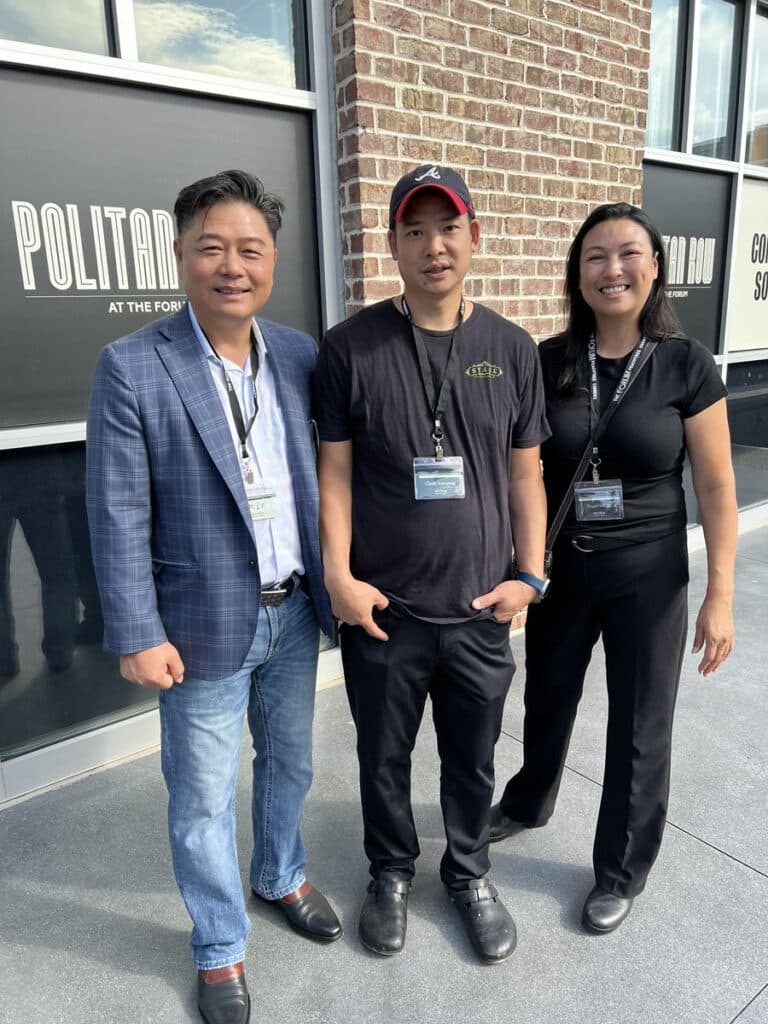
The popularity of those suburban concepts has already taken off. With Sheesh, they’re looking to do something different.
“There are going to be some things that are unique to Sheesh that you’re not going to get at the other places,” said Sunyapong. “You’re not getting a whole restaurant; this is quicker fare.”
Gekko Kitchen, a former food truck transformed into a hibachi and ramen experience, will be serving fresh, fast bowls that are more colorful and lighter than traditional hibachi fare.
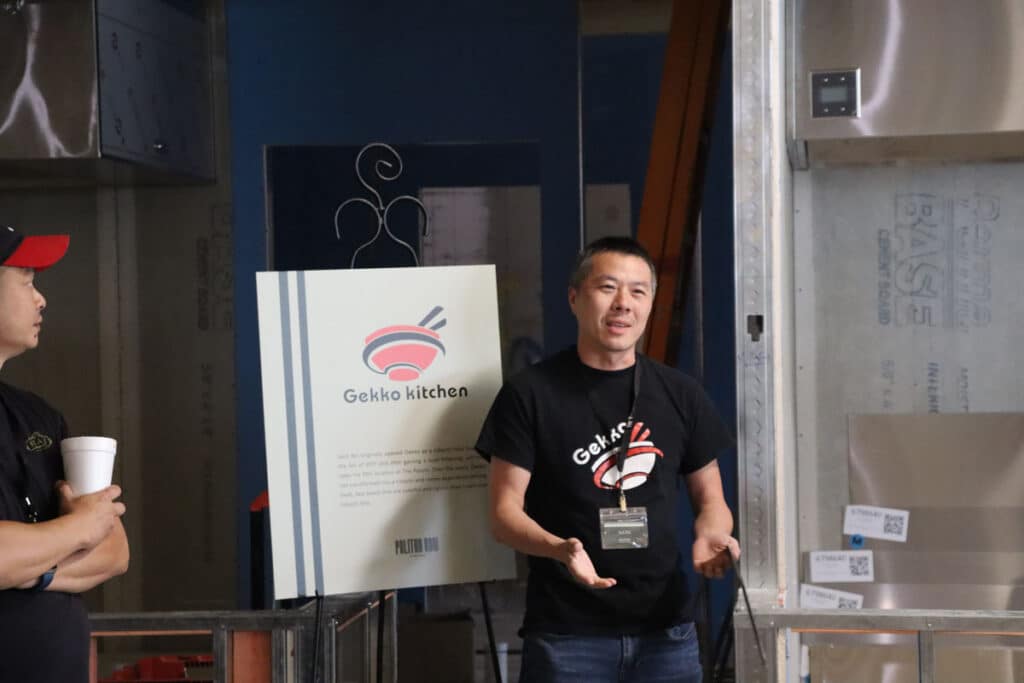
Gathering spots
Development Manager Nick Lombardo explained that NAP is moving away from building big construction projects from scratch like Colony Square in Midtown Atlanta and Avalon in Alpharetta.
“As a company, North American Properties pivoted around 2020 from building big ground-up construction to more redevelopment with already existing properties,” he said. “With the thought of great assets that just need a little more attention Infused into them to create value, we bought the Forum in 2022.”
He said that value-add propositions done at The Forum will create a more walkable center.
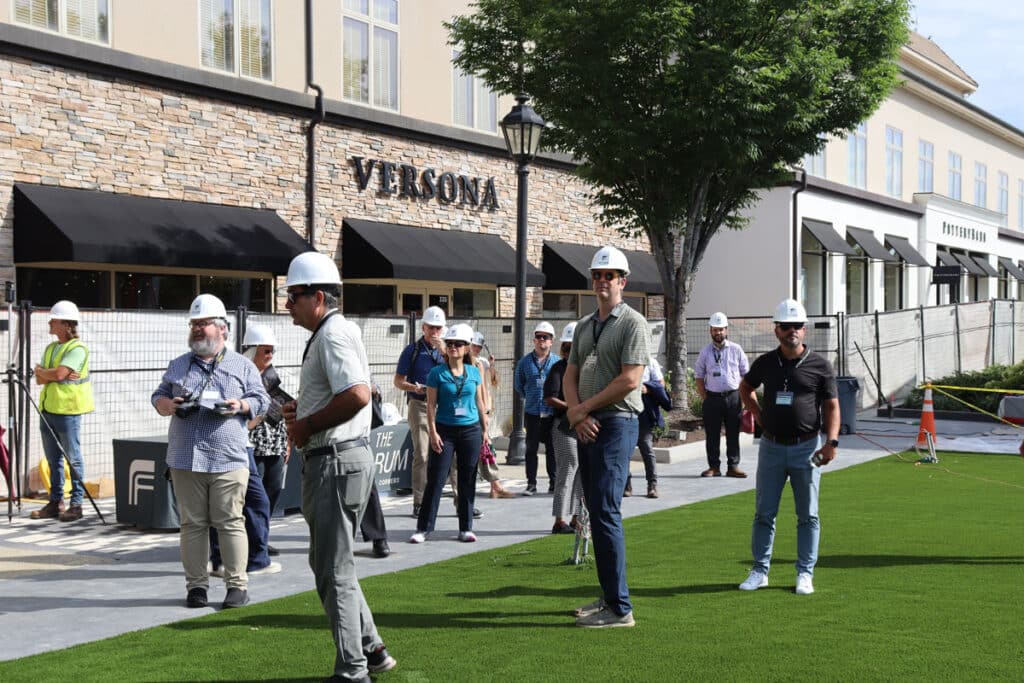
“Trying to compete with the internet on convenience is a very tough task, so the way we differentiate is by experiences,” he said. “We host between 150 to 200 events every year. We have things like concerts, wellness and fitness events and we have child playtime events. Our marketing team does a great job and they’re the differentiator when it comes to what makes our property stand out.”
By the first week of August, a large gathering space will be unveiled in the central area of the property between Pottery Barn and seafood restaurant Pêche. It will have a nine-foot LED screen capable of hosting movie nights and sports viewing. There will also be musical performances featuring local artists.
“We’re not in competition with Town Center,” said Charlotte Hinton, marketing manager at The Forum. “Town Center has gates like a real music festival and we’re more like a ‘chill and enjoy the music’ vibe where you can grab a beer and hang out or maybe kind of walk around.”
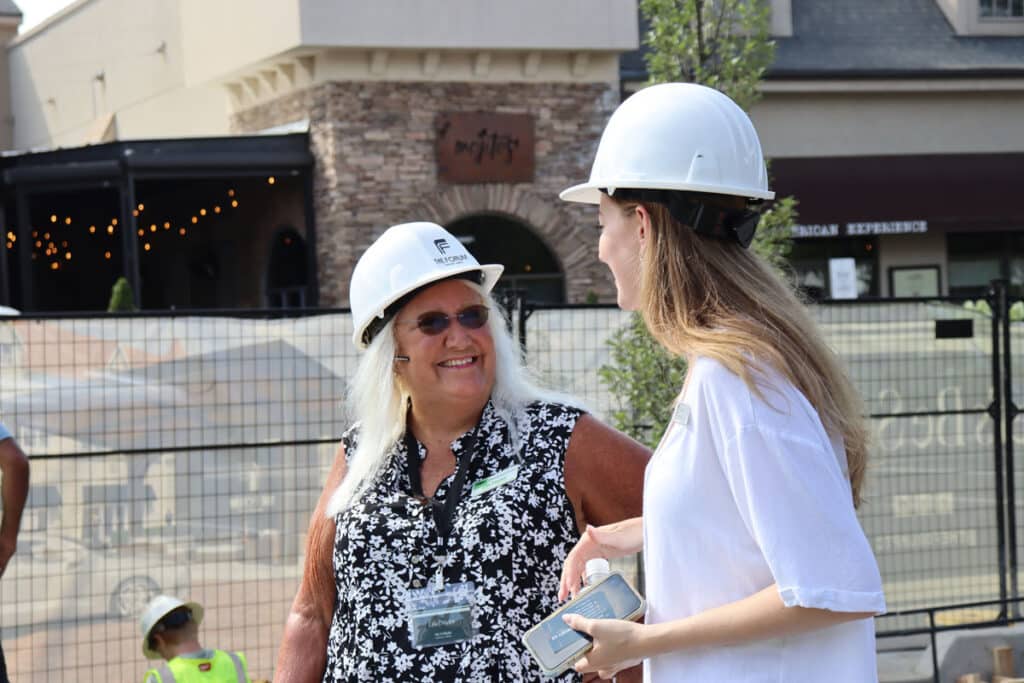
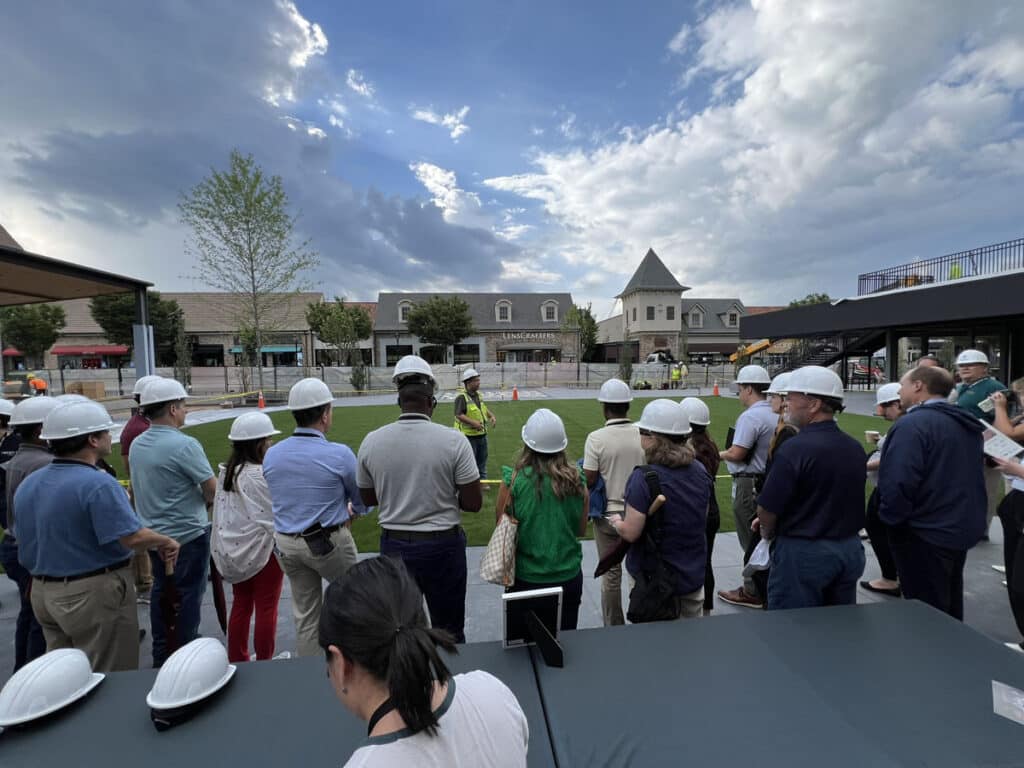
The smaller space and artificial turf are unlike the Town Center space where attendees spread blankets and bring chairs. The Forum will have furniture and seating in the space so folks can just gather and either enjoy time with family or partake in events.
The Forum will also offer valet parking on a limited schedule at that end of the property.
More improvements
Although the construction equipment will have moved out, the jewel box building will house a yet-to-be-named restaurant that will open early next year.
“We’re pretty much done with what we’re doing as far as landlord work,” said Lombardo. “We ask our tenants to bring their brand and their design and their material pallet and put that on the building to express their brand identity. They know their brand better than we do. They know how to best design their building and how it functions and works.”
It’s the same process with retail stores, he added.

“We always ask all of our new tenants to come in here when they’re building their storefront,” he said. “They’re not just selling their clothes; they’re selling a lifestyle in the brand so we ask them to push their brand out to the street.”
Even with the new spaces, there will be no shortage of parking, Lombardo added. “There’s plenty of parking behind these buildings,” he said pointing toward Pêche. “What we’ve done is enhance the connectivity to those areas. We’ve redone this breezeway and we’re adding lighting and connecting the parking lot to the main boulevard here. The goal is to replace cars with people and activity and bring a sense of community to the property.”
Related
Business
Taste of Peachtree Corners: PCBA Showcases Local Restaurants
Published
1 week agoon
July 17, 2024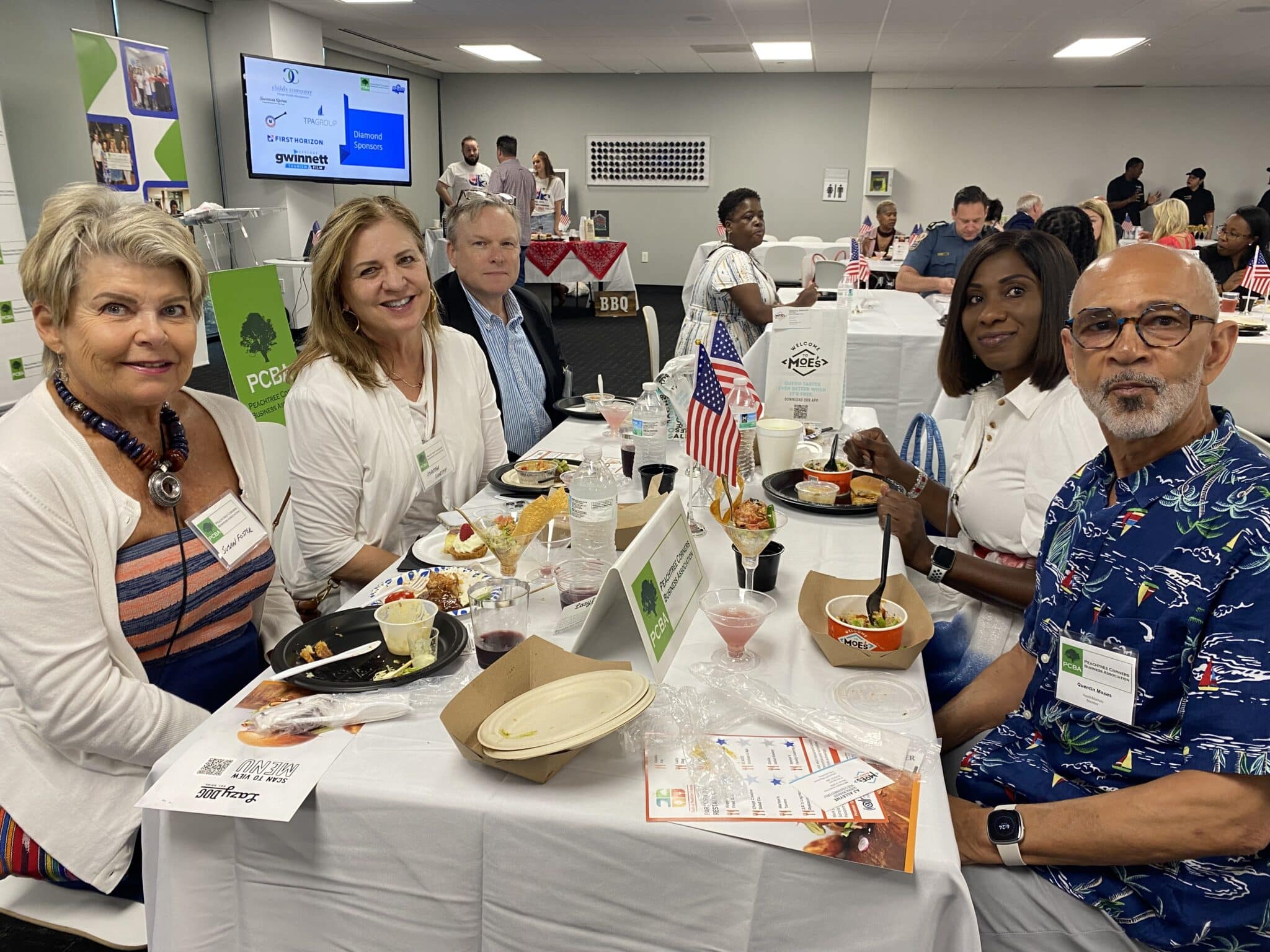
The Taste of Peachtree Corners has been in the works for years, but the COVID-19 pandemic put many key events on hold for the Peachtree Corners Business Association (PCBA).
But luckily this year, the dedicated staff of volunteers successfully executed a memorable event and introduced a lot of local business owners to their neighboring restaurants and caterers.
As I walked up to the Community Chest Room at Peachtree Corners City Hall on June 27, there was a line outside the door. I later found out that over 100 people had registered to attend the event. I got checked in quickly and was faced with a “passport” of 10 Peachtree Corners restaurants serving everything from high-end bakery items to good old-fashioned barbecue, and modern twists on seafood and American cuisines.
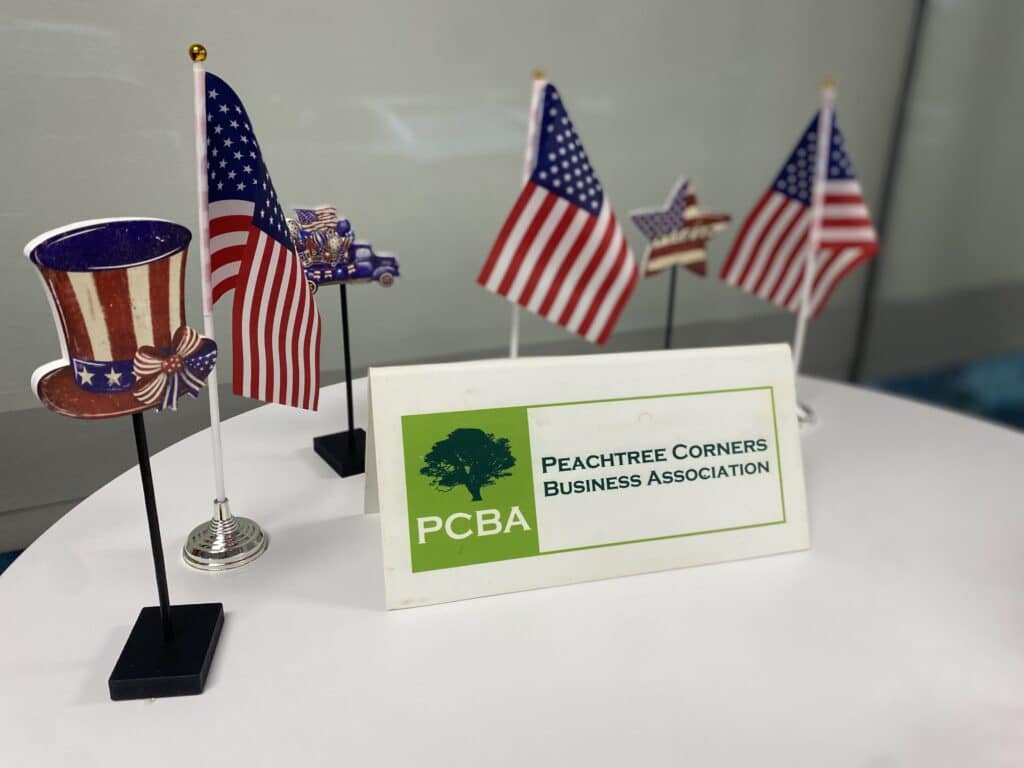
Let’s talk about the food
The idea was to visit all 10 restaurants and collect stars while trying samples and small plates. My first stop was Firebirds Wood Fired Grill, and they had my favorite – homemade chips and queso. The queso was smoky and mildly spicy with a great depth of flavor. What a great start. Next up was Chopt. Creative Salad Co. I had never heard of this restaurant before, but they blew me away with a perfect amuse-bouche of cherry tomato, pesto, mozzarella, and olive oil. These guys understand simple and fresh Mediterranean flavors.
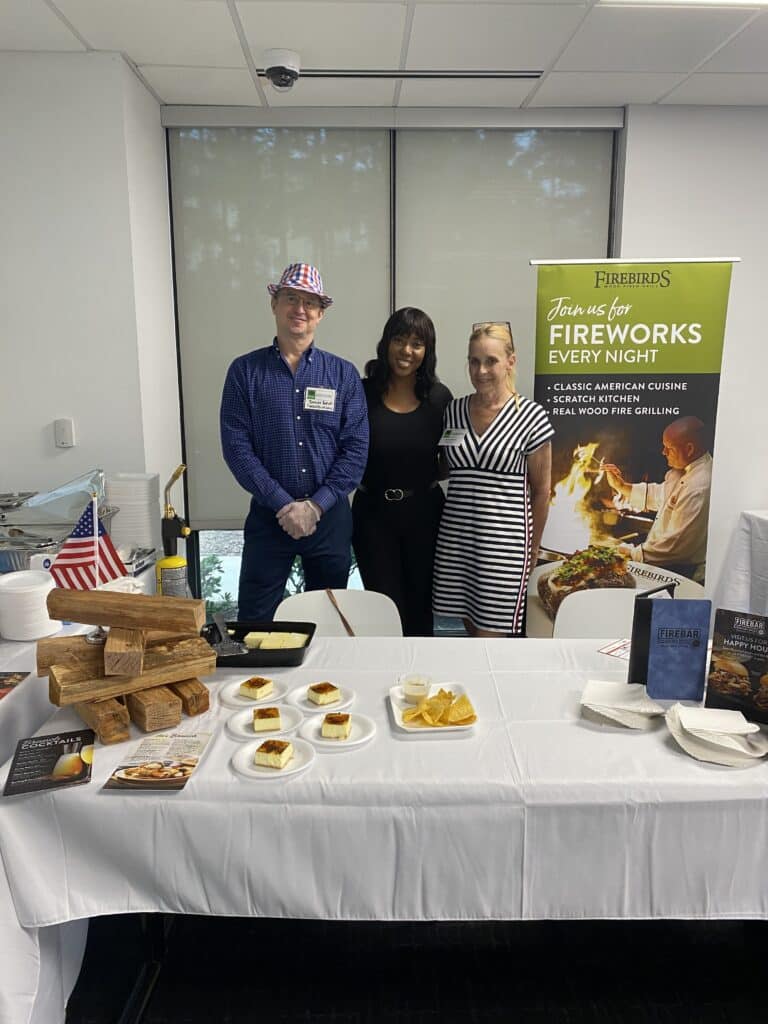
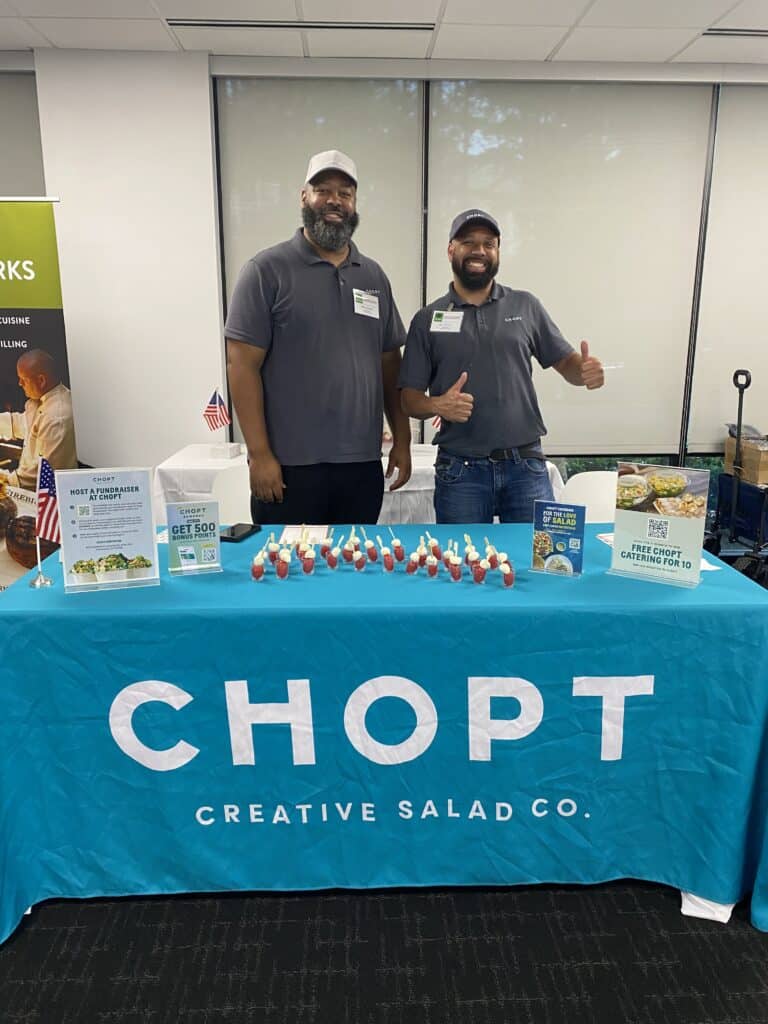
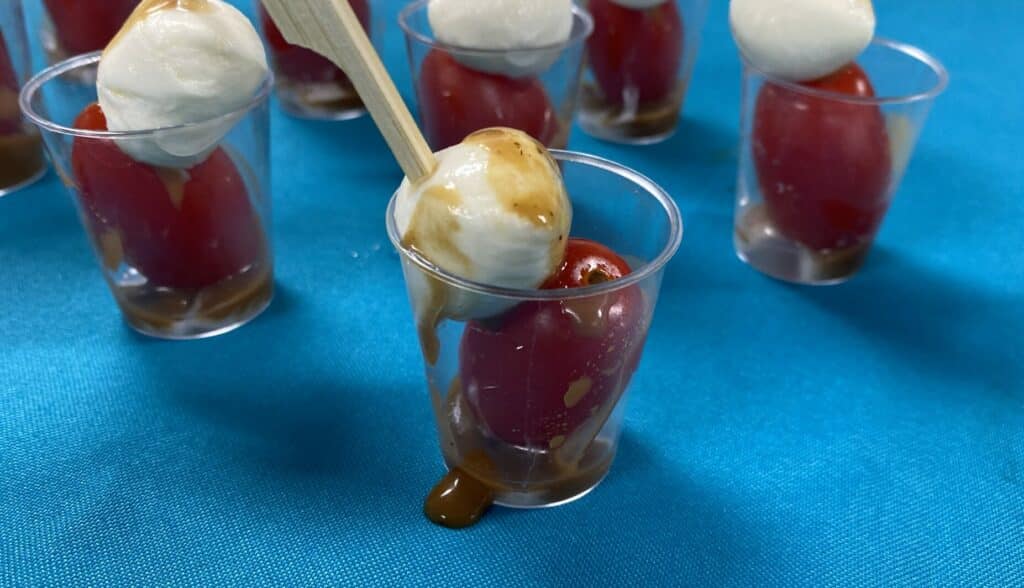
The folks from Marlow’s Tavern were also on-site serving shrimp and grits with jalapeno, spinach and tomato beurre blanc. This is definitely the style of elevated food I’ve come to expect from Marlow’s. And as a nice touch, they prepared a refreshing blueberry cocktail.
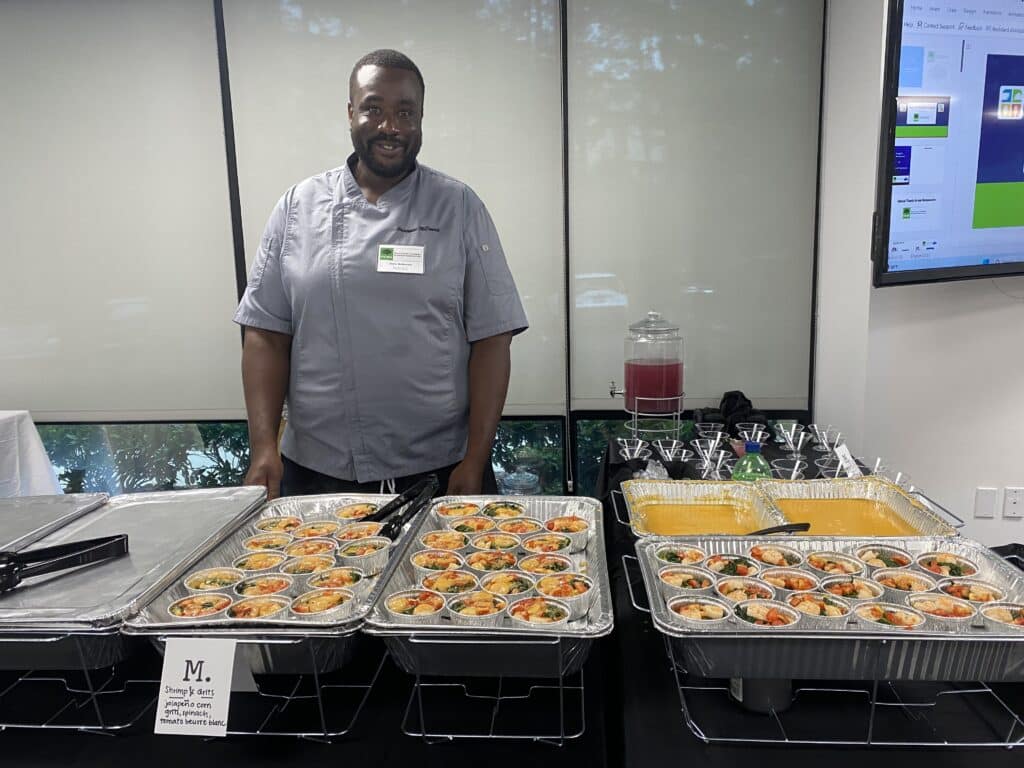
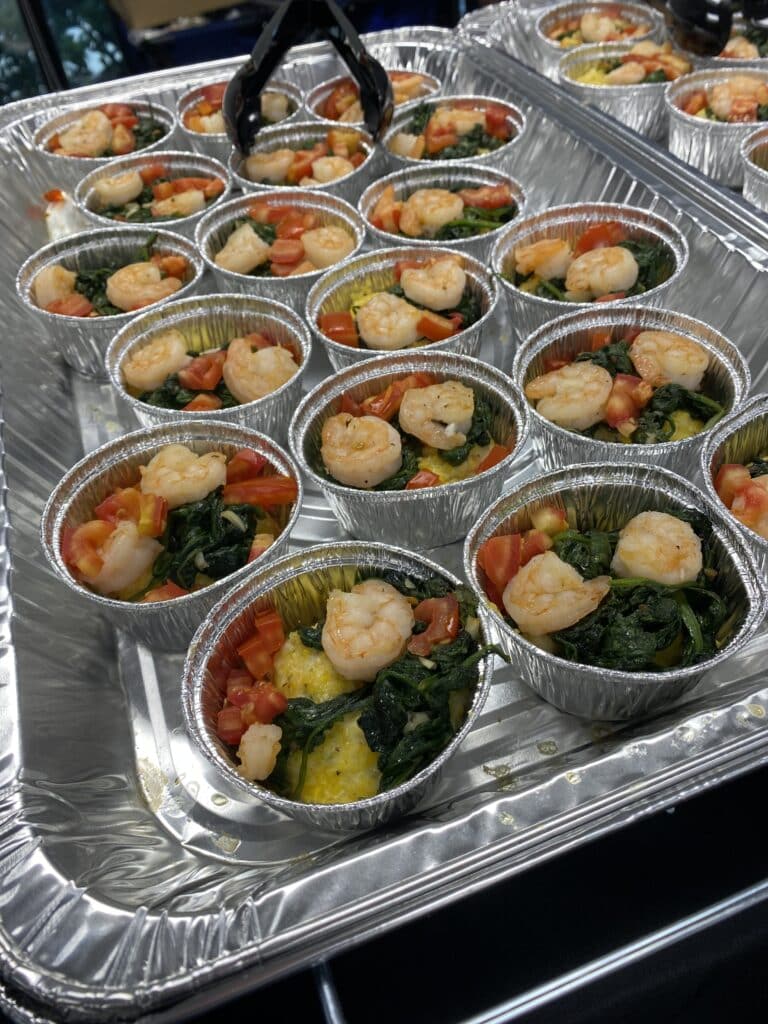
Another familiar face was set up on the other side of the room. J.R.’s Log House Restaurant served southern favorites like pulled pork sliders, baked beans and mac n’ cheese. I couldn’t pass this one up. The pulled pork was tender, tangy and saucy. Exactly what I want from a barbecue. Lazy Dog’s table really impressed me with its presentation. The tuna cup with rice, avocado and chili with chips on the side, was a real stunner.
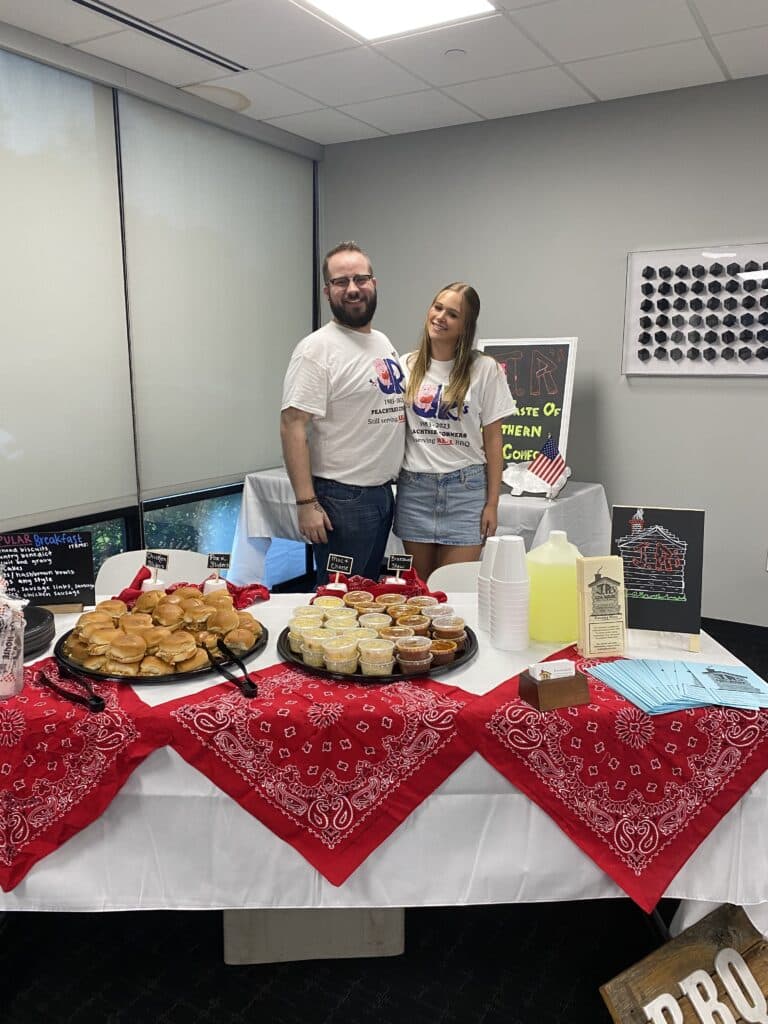
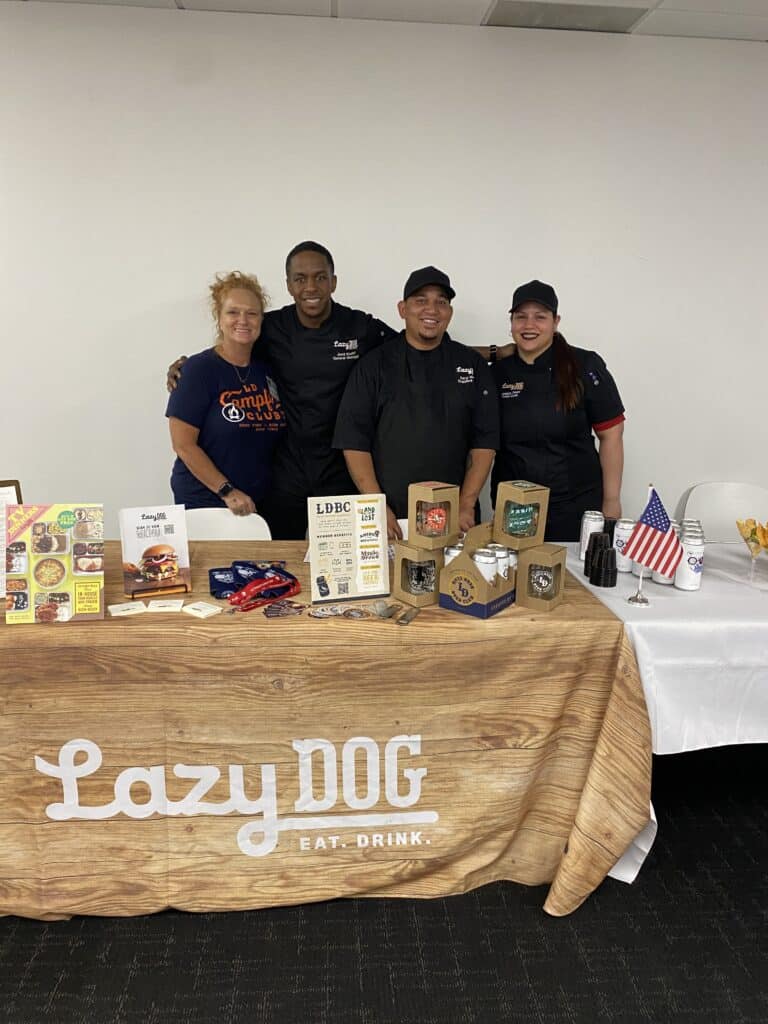
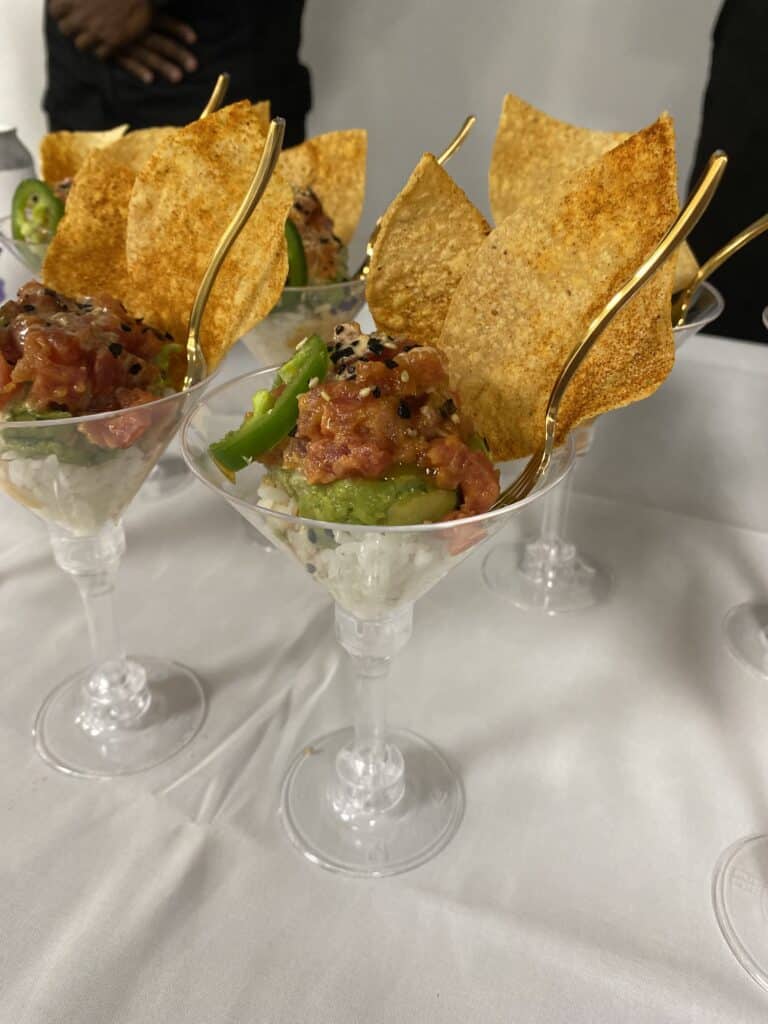
Moe’s Southwest Grill was also on-site handing out tasty tequila lime chicken with rice, avocado, and black beans. This super hearty and comforting entrée was followed by a seafood course from PECHE Modern Coastal. Crab cakes with a croissant pinwheel, roasted garlic and lemon aioli and arugula were on the menu and the flavor combinations were simply fantastic.
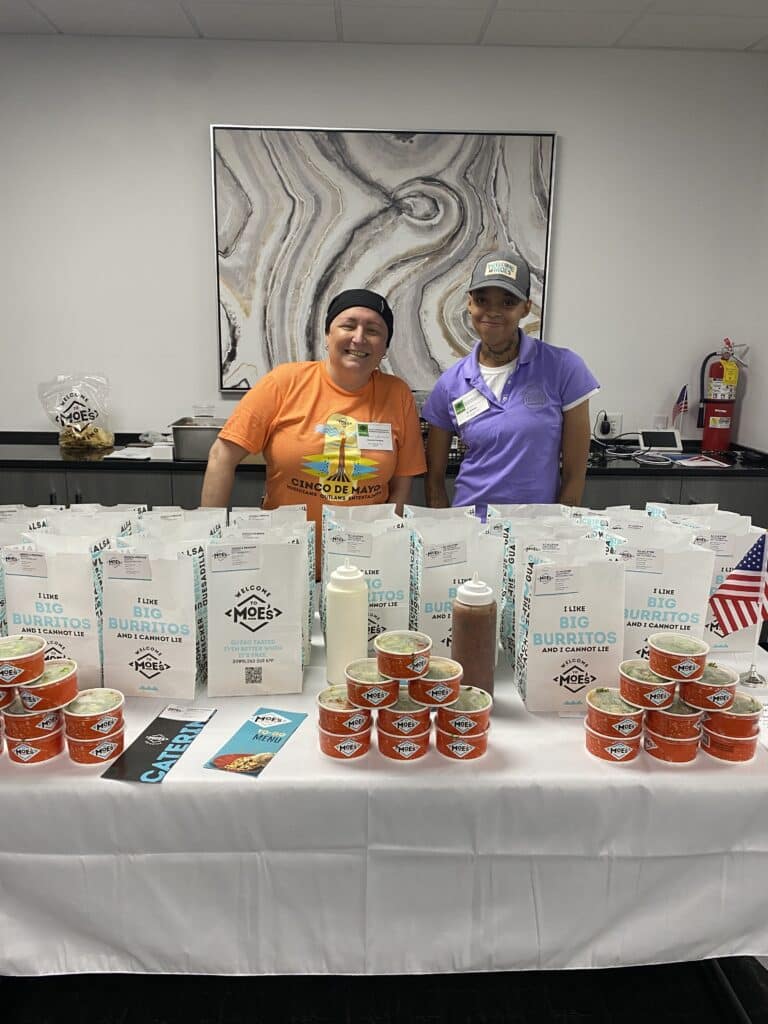
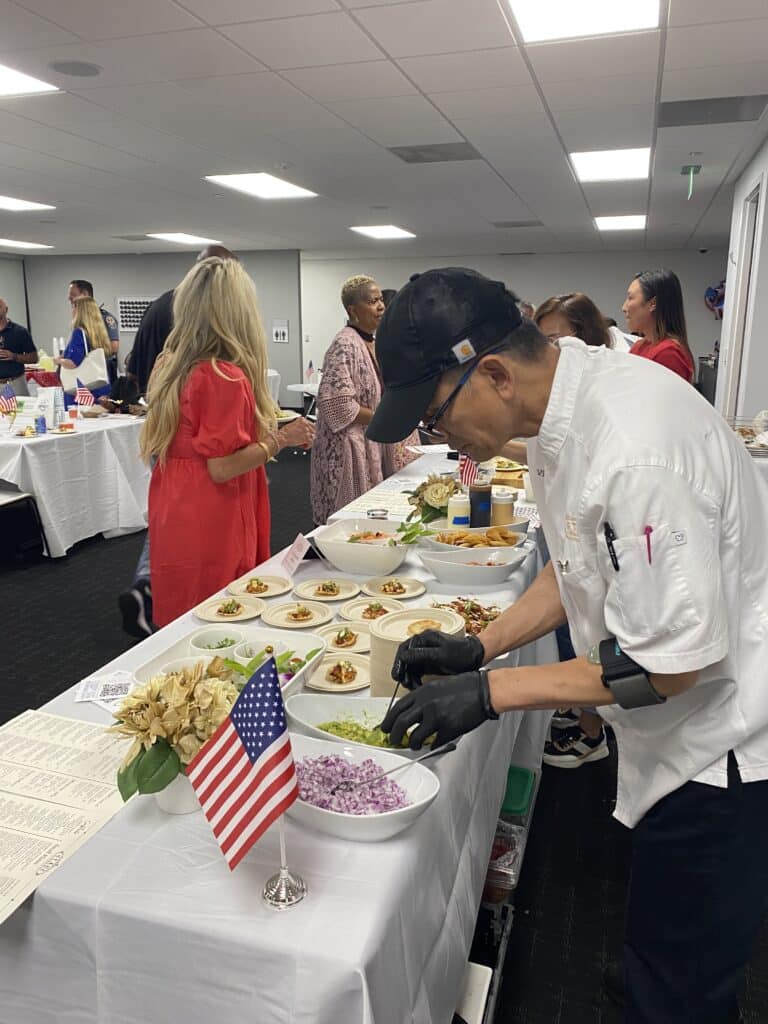
PECHE’s sister restaurant STAGE Kitchen & Bar was next door offering a tuna and salmon tostada with avocado, eel sauce, spicy mayo, and cilantro. This was easily one of my favorite bites of the night. The tostada was crunchy and light with clean and bright flavors. No kidding, I could probably eat this every day for lunch.
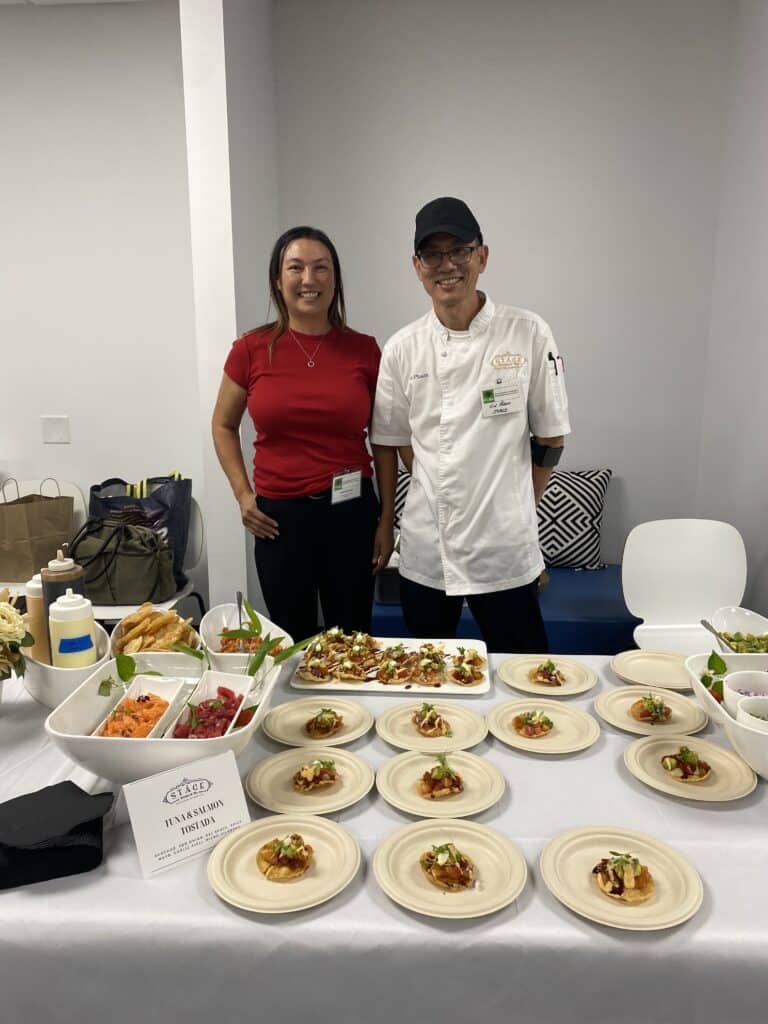
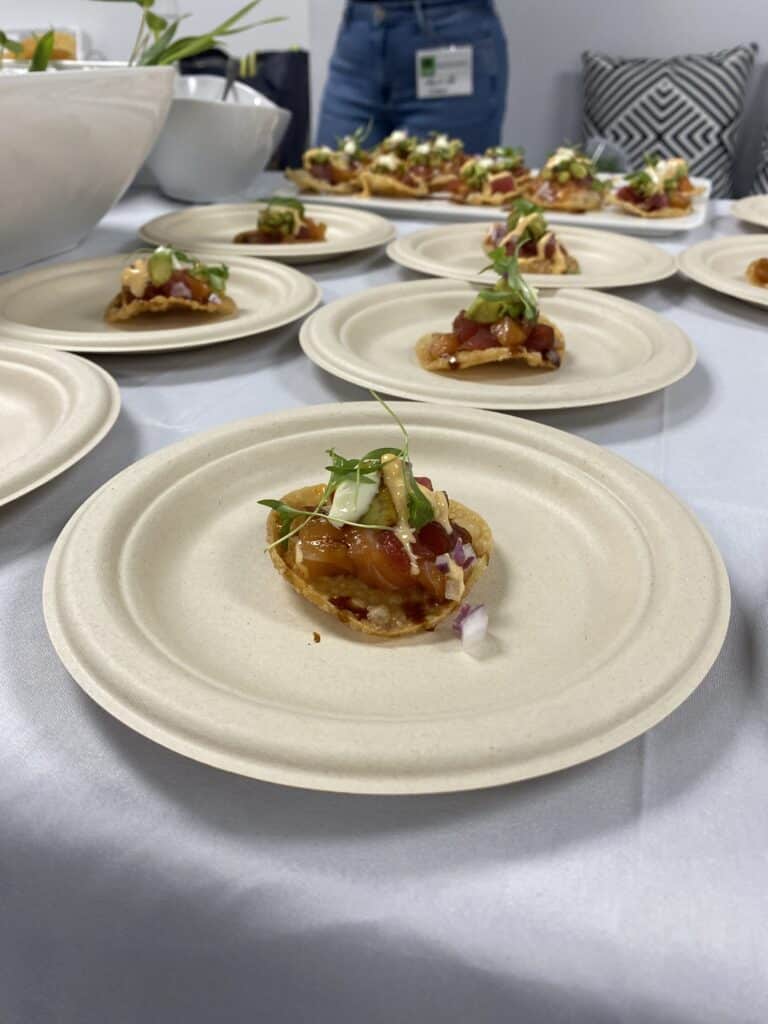
I moved on the Smoke’s Family Catering and owner Phillip Smoke had whipped up enough barbecue to feed an army. I had the pleasure of trying the smoked chicken with potato salad and it was the perfect pairing. Last but not least: dessert. I capped off the evening with a beautiful chocolate ganache-filled croissant with perfect lamination and flaky texture.
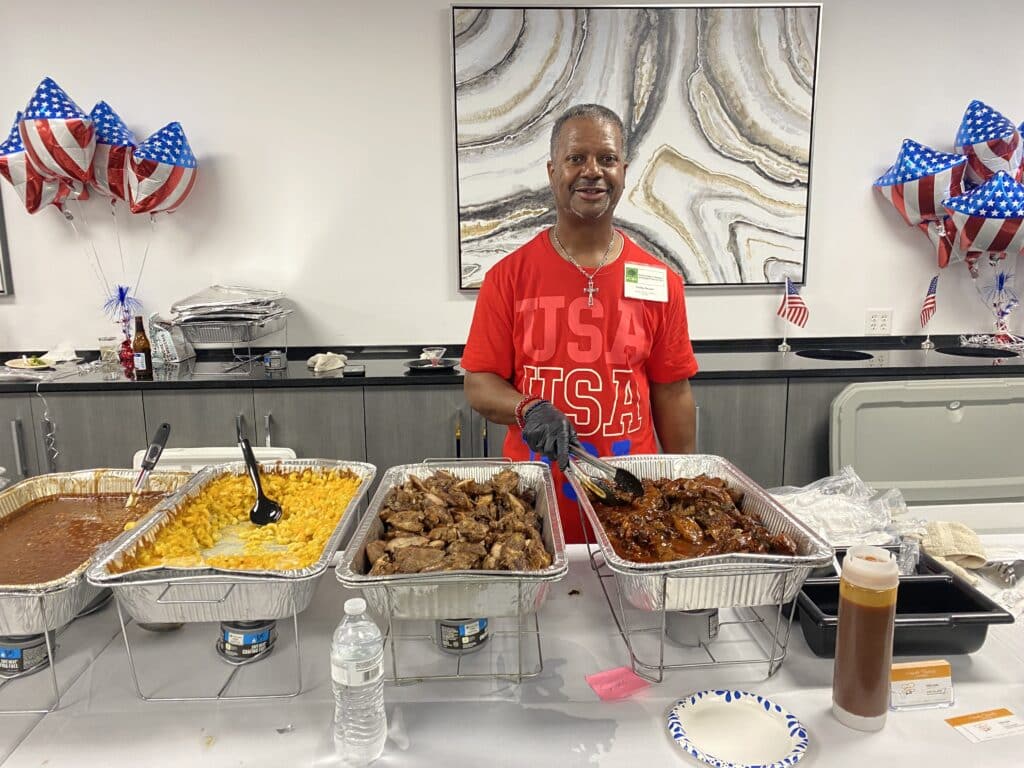
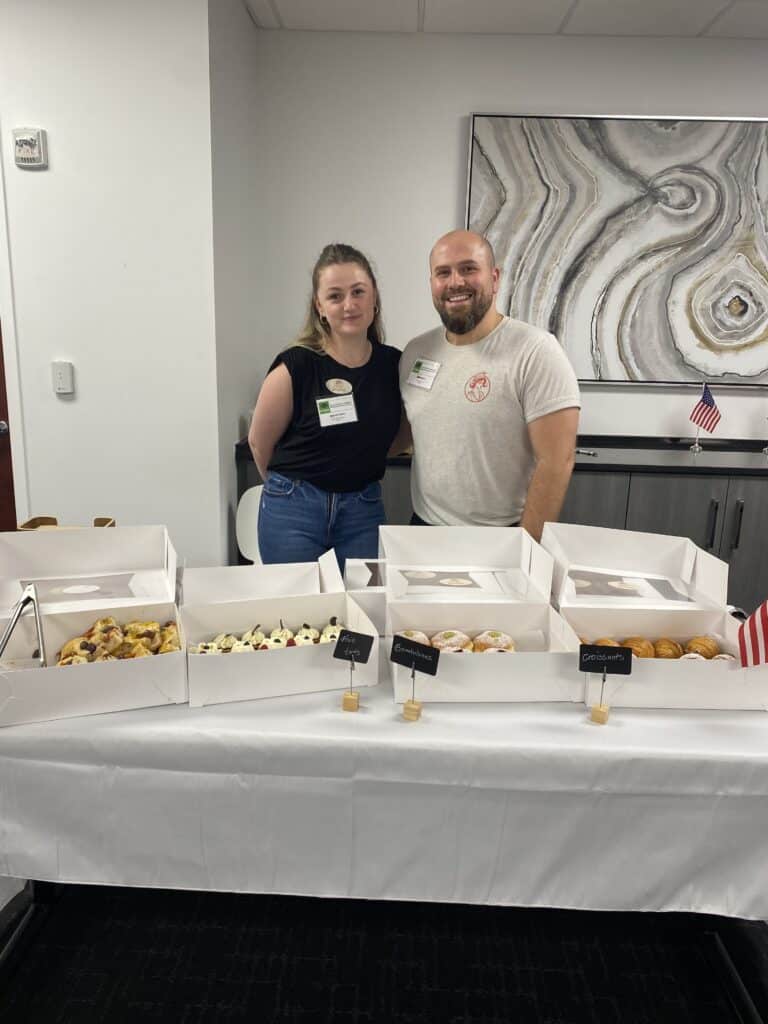
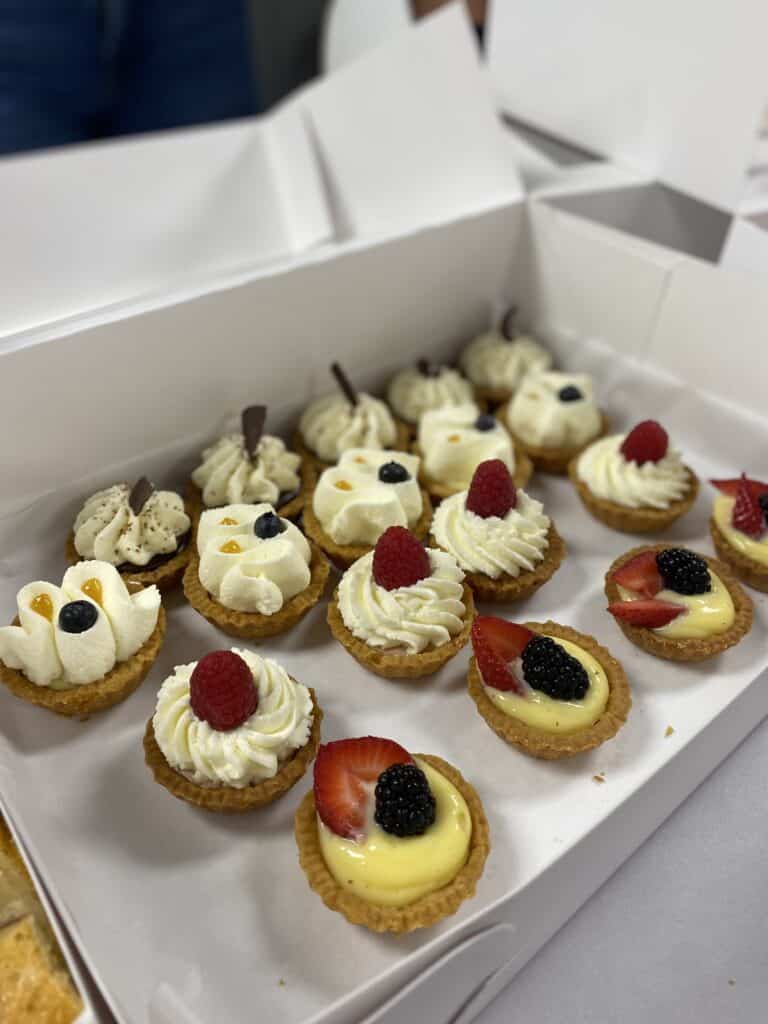
The inspiration behind the event
With a (very) full stomach, I caught up with PCBA President Lisa Proctor to talk about the event.
“We knew that COVID was really hard on a lot of our restaurants to get people back in,” said Proctor. “We wanted to do it in June because we wanted to celebrate our military. Everybody remembers them maybe on Memorial Day or different things, but June is the 80th anniversary of D-Day.”
“The military is always close to our heart,” she added. “We’re also very proud of our restaurants. They all have gone above and beyond.”
Tonight, the PCBA was honoring the Armed Forces and its brave veterans while bestowing two donation checks to very worthy causes.
The first check for $500 went to Folds of Honor. Since 2007, Folds of Honor has provided life-changing scholarships to the spouses and children of America’s fallen or disabled military. And now, their mission expands to the families of America’s first responders.
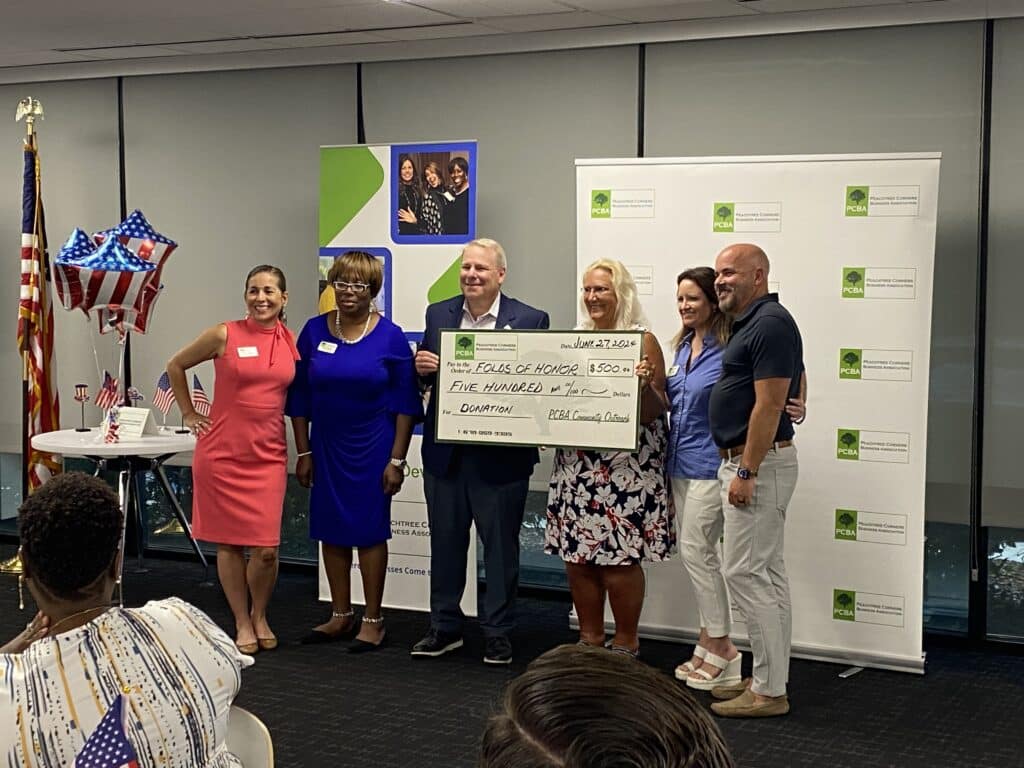
The second check for $500 was given to Light Up the Corners, a 501(c)(3) volunteer organization with an annual glowing, flashing, blinking, shining, nighttime running party and fundraiser in one. All proceeds from the event go to benefit less fortunate children and families in the Peachtree Corners community who are struggling by giving them the chance to participate in life-enhancing programs and activities at the Fowler YMCA.

Over the past 12 years, the PCBA has awarded 19 scholarships and donated more than $156,000+ back to the Peachtree Corners community.
Related
Business
Local Resident Opens AtWork Location in Peachtree Corners
Published
2 weeks agoon
July 10, 2024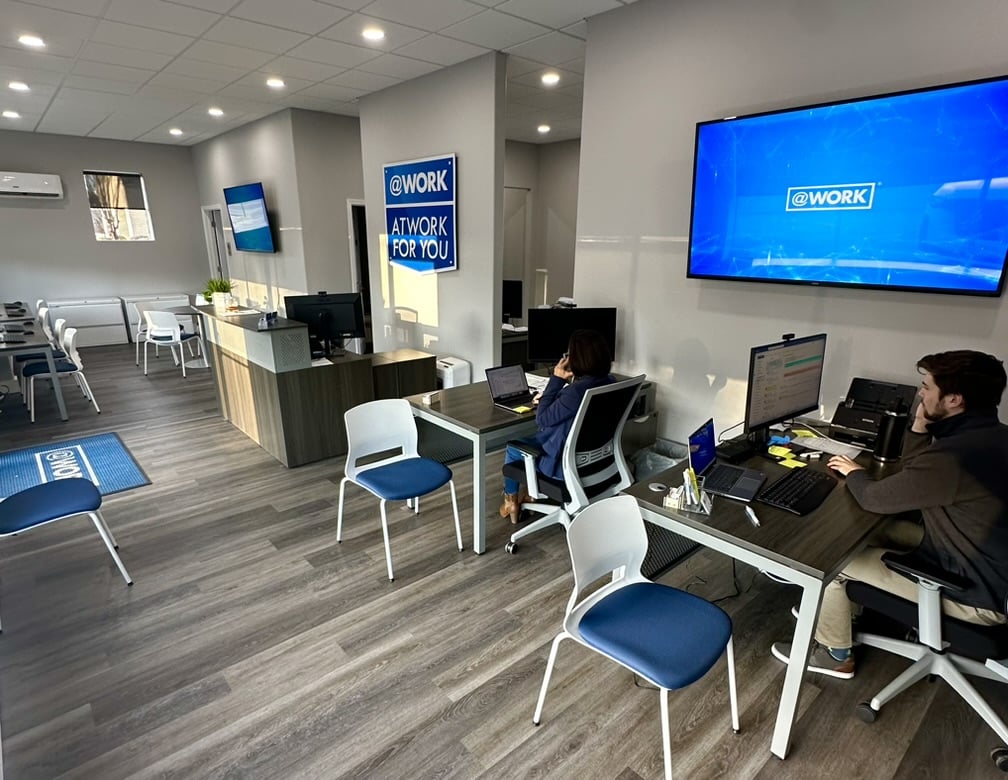
AtWork, one of nation’s leading staffing franchises, has opened its third Metro Atlanta location in Peachtree Corners, Georgia at 6185 Buford Highway, Suite E-100.
AtWork Peachtree Corners is locally-owned by Kamal Bhatia, an immigrant from India with decades of experience in hospitality and as the Senior Vice President of Operations of Atlanta-based Action Bartending School.

“There is an incredible need for AtWork’s services in Peachtree Corners,” said Bhatia. “Since migrating here in 1996, I’ve witnessed Atlanta evolve and sprout new communities north of the city, including my own. Peachtree Corners has become a hub for thriving businesses, and my goal with this location is to be a key resource between companies and job seekers to support the continued growth of our local economy.”
Bhatia’s son and daughter will assist him in the business.
“This is an opportunity to create a legacy company to ensure our community is supported for generations to come,” he said.
For more than three decades, AtWork’s mission has been to connect people with jobs and jobs with people. With more than 100 locations nationwide, AtWork puts nearly 40,000 individuals to work each year in administrative, light-industrial, accounting and finance, hospitality, IT and management-level positions at some of the nation’s largest and most recognizable companies.
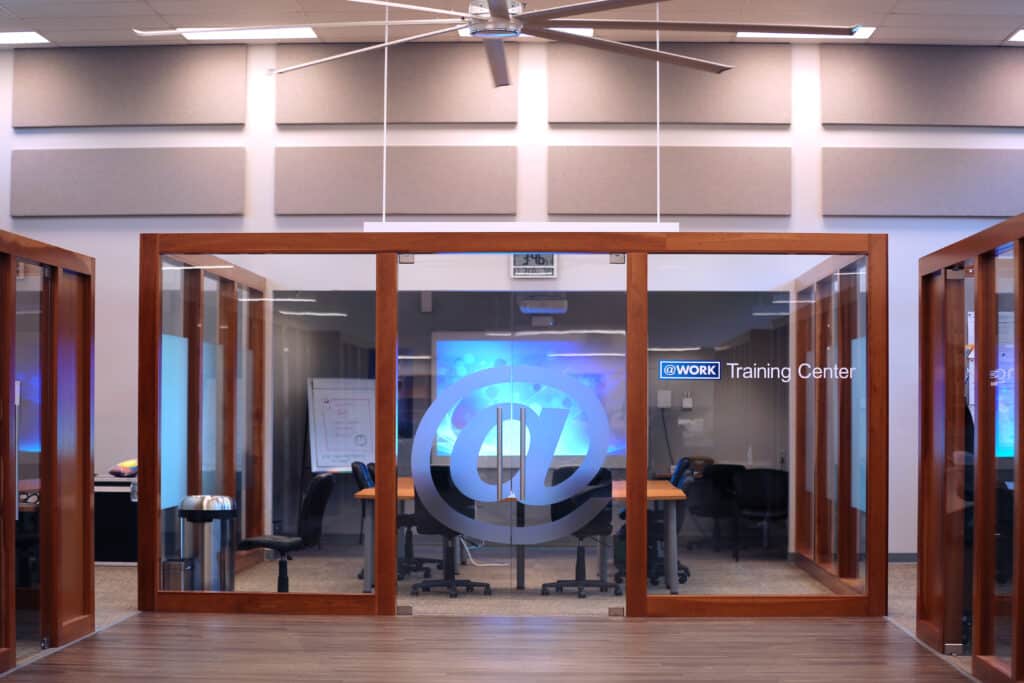
“We’re proud to open our doors in Peachtree Corners and provide a common place for both job seekers and growing businesses to turn for staffing solutions,” said Jason Leverant, President and COO of AtWork.
“AtWork will serve as a key resource to help employees thrive, businesses prosper and communities flourish. Kamal is the perfect partner to champion our mission and be a servant leader in her local community,” he added.
Related
Read the Digital Edition
Subscribe
Keep Up With Peachtree Corners News
Join our mailing list to receive the latest news and updates from our team.
You have Successfully Subscribed!

What’s going on at Jones Bridge Park and the Challenges of Urban Development

Taste of Peachtree Corners: PCBA Showcases Local Restaurants

The Forum Gives Sneak Peek of New Eateries and Community Spaces

Southwest Gwinnett Mayors Share Visions for the Future

8 Events Happening In and Around Peachtree Corners This August

Peachtree Corners Shines Bright with Light Up the Corners Glow Race this August

Peachtree Corners Shines Bright with Light Up the Corners Glow Race this August

The Forum Gives Sneak Peek of New Eateries and Community Spaces

8 Events Happening In and Around Peachtree Corners This August

Southwest Gwinnett Mayors Share Visions for the Future

Taste of Peachtree Corners: PCBA Showcases Local Restaurants

What’s going on at Jones Bridge Park and the Challenges of Urban Development

Local Resident Opens AtWork Location in Peachtree Corners

CHRIS 180 Expands its Services into Gwinnett County [Podcast]

Light up the Corners [Video]

Capitalist Sage: Business Leadership in Your Community [Podcast]

Cliff Bramble: A Culinary Adventure through Italy

Top 10 Brunch Places in Gwinnett County

A Hunger for Hospitality

THE CORNERS EPISODE 3 – BLAXICAN PART 1

Top 10 Indoor Things To Do This Winter

The ED Hour: What it takes to Remove Barriers from Education
Peachtree Corners Life
Topics and Categories
Trending
-
Business1 week ago
Taste of Peachtree Corners: PCBA Showcases Local Restaurants
-
Business2 days ago
The Forum Gives Sneak Peek of New Eateries and Community Spaces
-
City Government4 days ago
Southwest Gwinnett Mayors Share Visions for the Future
-
Around Atlanta4 days ago
8 Events Happening In and Around Peachtree Corners This August







